Talking Turkey: Alternate History from 1936
- Thread starter Bullfilter
- Start date
-
We have updated our Community Code of Conduct. Please read through the new rules for the forum that are an integral part of Paradox Interactive’s User Agreement.
You are using an out of date browser. It may not display this or other websites correctly.
You should upgrade or use an alternative browser.
You should upgrade or use an alternative browser.
Threadmarks
View all 328 threadmarks
Reader mode
Reader mode
Recent threadmarks
Chapter 274: April 1950 Chapter 275: May 1950 Chapter 233: ¡No Pasarán! The Second Spanish Popular Front (18-31 August 1944) Chapter 276: June 1950 Chapter 277: July 1950 Chapter 278: August 1950 Chapter 279: September 1950 Chapter 280: October 1950Yes, indeed. I have 50% Polish ancestry, so you don't want to get me started, it's"Poland, the welcome mat of Europe. Everybody steps on us."
Though I'd love nothing better than to see Poland trounce the Hitlerites and march into Berlin by spring 1940 ... the first look at current pre-war dispositions does nothing to inspire such fanciful dreams
- 1
Chapter 63: Special War Edition (31 August – 7 September 1939)
Chapter 63: Special War Edition (31 August – 7 September 1939)
[Ed: I forgot I had stopped at 30 rather than 31 Aug in the last issue. It allows for some last-minute diplomacy, mainly between Britain and Germany, to be conducted. Alas, in vain. The inevitable hammer will soon fall heavily on our brave Polish friends.]
31 Aug 39 – War’s Eve
The final tracks are laid for the new Ankara-Adana Railway upgrade in the very early hours of 31 Aug. A later project would be to improve communication links across to Iran, but that will have to wait for now. For now, the urgent construction of additional air defences continues, as it will be a long time before we are likely to have access to decent fighter licenses.
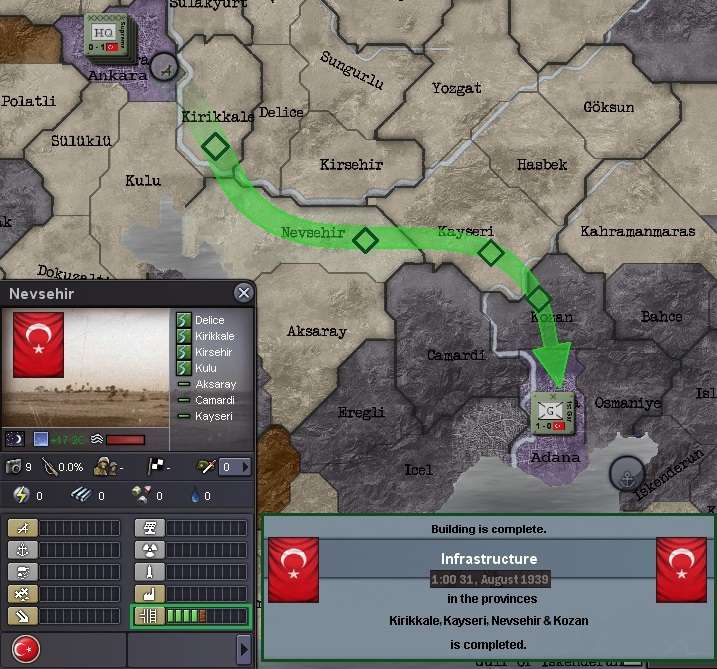
British Ambassador Nevile Henderson has flown back to Berlin late the night before with his government's official position on Poland, which he presents to Hitler first thing [in this ATL] on the morning of Thursday 31 August. As relayed by our French network, Britain is prepared to take Hitler's proposals as “subjects for discussion” and agrees there must be settlement of differences between Germany and Poland, but notes that everything turned “upon the nature of the settlement and the method by which it is to be reached.” Germany is reminded that “His Majesty's Government have obligations to Poland by which they are bound and which they intend to honour. They could not, for any advantage offered to Great Britain, acquiesce in a settlement which put in jeopardy the independence of a State to whom they have given their guarantee.”
Britain suggests the next step “should be the initiation of direct discussions between the German and Polish Governments on a basis which would include the principles stated above, namely, the safeguarding of Poland's essential interests and the securing of the settlement by an international guarantee.” The reply concludes with a warning that failure to reach a settlement “would ruin the hopes of better understanding between Germany and Great Britain, would bring the two countries into conflict, and might well plunge the whole world into war. Such an outcome would be a calamity without parallel in history.”
Hitler reads a German translation of the British government's note and tells Henderson he is willing to negotiate, but Poland could not be reasonable. Henderson firmly replies that Hitler would have to choose between war with Poland or friendship with Britain. Hitler says he would prepare a written reply of his own.
Hitler's reply to Britain arrives later that morning. He demands the return of Danzig and the Polish Corridor and writes that Germany could “no longer share” Britain's view that “these grave differences can be resolved by way of direct negotiations.” Despite this, Hitler writes, Germany is prepared to enter direct discussions “to give the British Government and the British nation a proof of the sincerity of Germany's intentions to enter into a lasting friendship with Great Britain.”
Nevile Henderson hands German Foreign Minister Constantin von Neurath the British government's reply that afternoon. “His Majesty's Government repeat that they reciprocate the German Government's desire for improved relations, but it will be recognised that they could not sacrifice the interests of other friends in order to obtain that improvement”, the note explains. “They fully understand that the German Government cannot sacrifice Germany's vital interests, but the Polish Government are in the same position and His Majesty's Government believe that the vital interests of the two countries are not incompatible.” The note expresses “reservation in regard to the statement of the particular demands put forward” by Germany, but says the German proposals would be “fully examined” during discussions.
Clearly, some time that evening Hitler issued orders to attack Poland the next day. At 6.15pm German Foreign Minister von Neurath meets with Polish ambassador Józef Lipski, more than five hours after Lipski had requested an audience. Lipski says the Polish government would be making a formal reply about direct negotiations in the next few hours. Neurath asks him if he is empowered to negotiate, and when Lipski replies that for the time being he is not, Neurath dismisses him. Lipski returns to the embassy and finds that his telephone line has been cut.
Later that night, in a false flag operation, Nazis posing as Poles seize the Gleiwitz radio station and broadcast an anti-German message in Polish (there will be other false flag operations the next day: they must have studied Turkey’s invasion of Bulgaria in 1937, right at the start of the Great Expansion). At 2100, German radio interrupts regular programming to present the government's 16-point proposal for Poland. The demand for the restoration of Danzig to the Reich is maintained, but the question of the Polish Corridor is now to be settled by a plebiscite. Warsaw never heard the proposal because communications between the two countries had been cut off. And by then, German forces were already deploying into their starting off positions on the Polish border anyway. It was all for show.
(2:24)
This Means War! More “Marxist Propaganda” from the Turkish Communications team.
Reports come in late that night from our observers in Poland and our network of agents in France. The key dispositions of forces are shown below – as it happens, the day before war is declared.
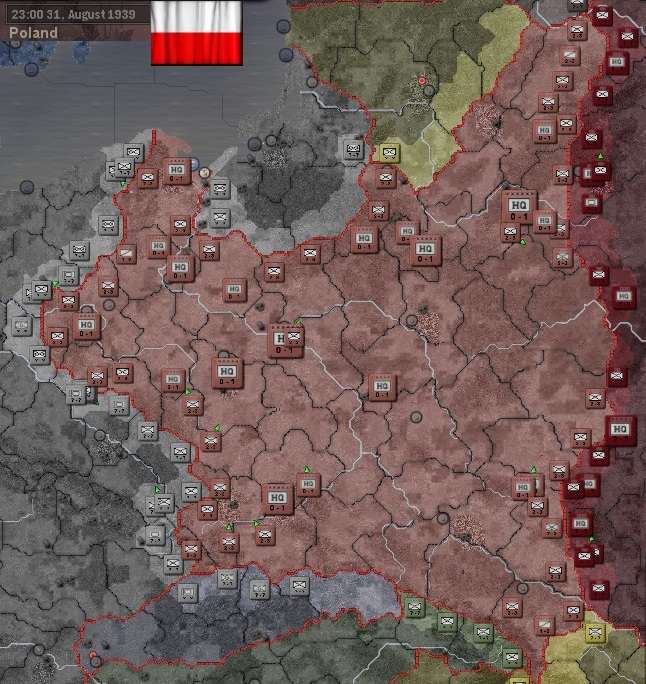
It transpires that Poland’s forces are fairly evenly distributed between their Soviet and German border areas (including East Prussia in the latter). While this may be a prudent reaction to the Nazi-Soviet Pact and the direct threat posed by the Soviets, it means that Poland is already paying the penalty for a two-front war. If Germany attacks first, those forces in the east will take a long time to be deployed to the west. Almost all the Polish units are ‘triangular’ infantry divisions with 3xINF each. There don’t seem to be any support (artillery, AT or AA) brigades among them. There are a few scattered cavalry divisions, but no visible armoured units. While it is hard to tell the full strength of the German units deployed on the border, there is a decent number of mechanised units in evidence.
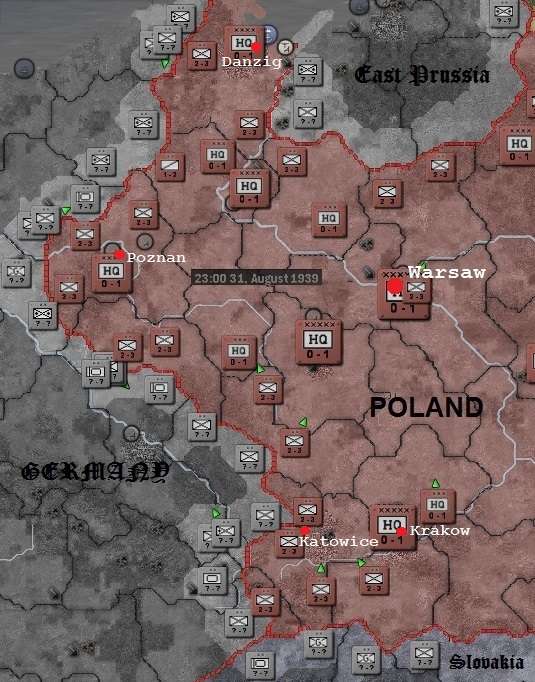
Dispositions are a bit clearer on this map of the Polish-German border. The Polish line looks very porous, while concentrations of German panzers and motorised units can be seen north and south of the Poznan salient and further to the south, near the Slovakian border and poised to strike towards Katowice and Krakow. Only on the central portion of the border with East Prussia (north of Warsaw )does the Polish Army seem to outnumber its adversaries.
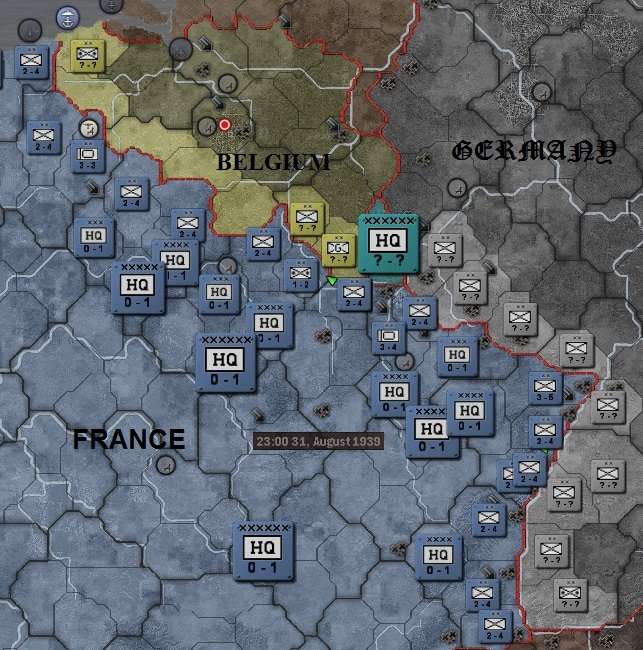
Concentrations of troops are not easily discernible in this map, but the Maginot Line – which stretches up to the Belgian border – is continuously manned. French forces are also poised along the Belgian border, but that country remains neutral and the French-Belgian border unfortified. Although Belgium has mobilised, it will be a race to see whether (if the neutral country is attacked, as it was in the Great War) it can hold its relatively short border with Germany long enough for the French to reinforce and hold it.
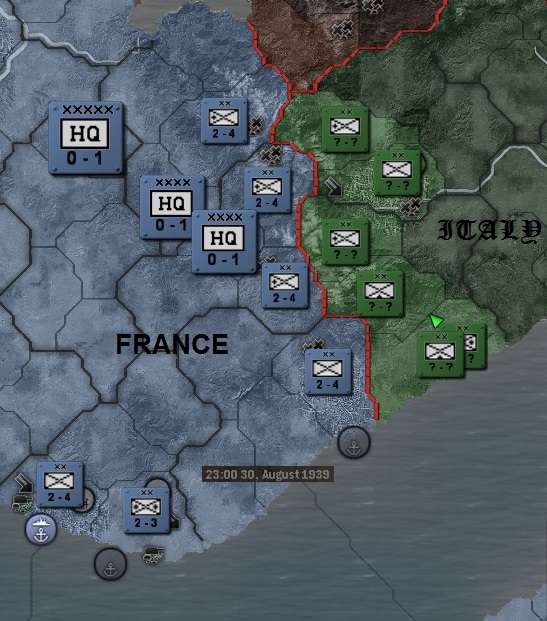
This more detailed map of the Franco-Italian border shows the southern (less heavily fortified but mountain-based) version of the Maginot Line is held mainly by a screen of elite mountain divisions. Similarly specialised Italian units face them.
1 Sep 39 – The Second Great War begins
The German invasion of Poland begins at 3pm. The Luftwaffe begins bombing raids on airfields, ships and troops. The first shots of the Second Great War (GW2) are fired. The series of battles collectively known as the Battle of the Border begin in Poland. There is no action on the Franco-German border.
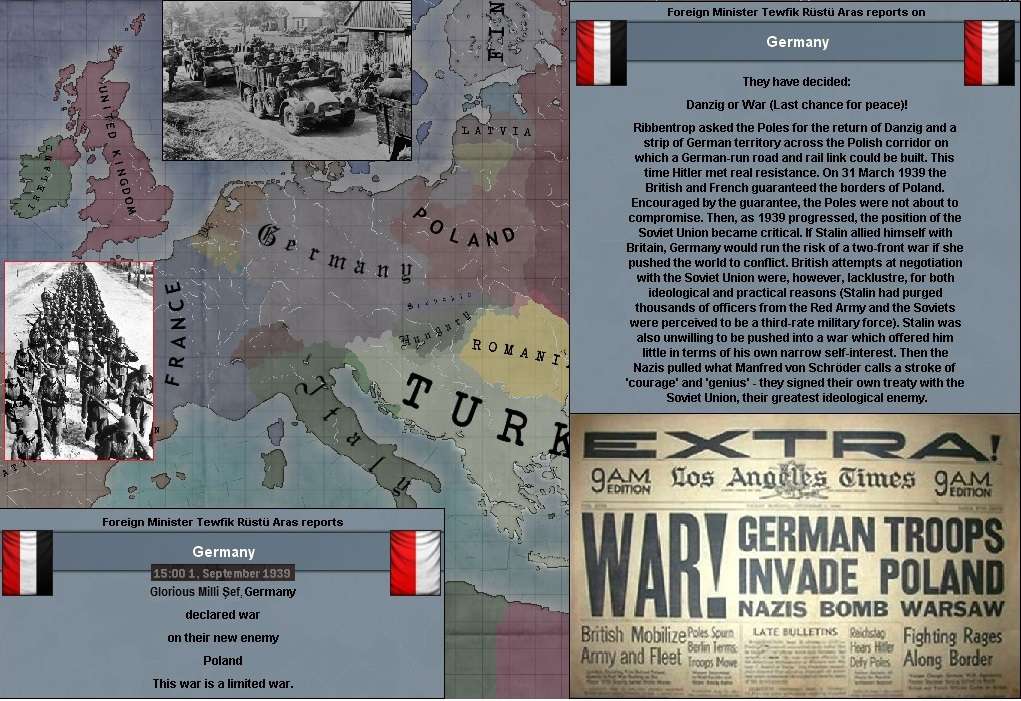
News Report: Berlin, Germany. Adolf Hitler broadcasts his declaration of war to the Wehrmacht at 1440: “The Polish state has refused the peaceful settlement of relations which I desired and appealed to arms”, Hitler declares. “In order to put an end to this lunacy I have no other choice than to meet force with force from now on. The German Army will fight the battle for the honour and the vital rights of a newborn Germany with hard determination.”
Intelligence Report, Rome Italy. As expected, Benito Mussolini orders his ambassador in Berlin to ask for a telegram releasing Italy from any obligation to take part in the war. At 2000 Hitler obliges with a cordial telegram saying he did not “expect to need Italy's military support in these circumstances.” They will remain neutral – for now, anyway.
News Report: London, UK. Neville Chamberlain announces on BBC Radio that Britain and Germany were at war [no delays for ultimatums etc in this ATL – straight into it, as with the Allies ‘an attack on one is an attack on all’.] “You can imagine what a bitter blow it is to me that all my long struggle to win peace has failed", Chamberlain says, sounding dispirited. “Yet I cannot believe that there is anything more or anything different that I could have done and that would have been more successful ... We and France are today, in fulfilment of our obligations, going to the aid of Poland, who is so bravely resisting this wicked and unprovoked attack upon her people. We have a clear conscience. We have done all that any country could do to establish peace, but a situation in which no word given by Germany's ruler could be trusted and no people or country could feel themselves safe had become intolerable. And now that we have resolved to finish it, I know that you will all play your part with calmness and courage.”
Neville Chamberlain addressed the House that evening and called it “a sad day for all of us, and to none is it sadder than to me. Everything that I have worked for, everything that I have hoped for, everything that I have believed in during my public life, has crashed into ruins. There is only one thing left for me to do; that is, to devote what strength and powers I have to forwarding the victory of the cause for which we have to sacrifice so much. I cannot tell what part I may be allowed to play myself; I trust I may live to see the day when Hitlerism has been destroyed and a liberated Europe has been re-established.”
Winston Churchill agreed that it was a sad day, but said “at the present time there is another note which may be present, and that is a feeling of thankfulness that, if these great trials were to come upon our Island, there is a generation of Britons here now ready to prove itself not unworthy of the days of yore and not unworthy of those great men, the fathers of our land, who laid the foundations of our laws and shaped the greatness of our country. This is not a question of fighting for Danzig or fighting for Poland. We are fighting to save the whole world from the pestilence of Nazi tyranny and in defence of all that is most sacred to man.”
A King’s Speech. At 9pm, King George VI addressed the British Empire by radio. “For the second time in the lives of most of us we are at war”, the King said. “Over and over again we have tried to find a peaceful way out of the differences between ourselves and those who are now our enemies. But it has been in vain ... The task will be hard. There may be dark days ahead and war is no longer confined to the battlefield but we can only do the right as we see the right and reverently command our cause to God. If one and all be resolutely faithful today, ready for whatever service and sacrifice it may demand, with God's help we shall prevail.”
News Report: Washington DC, US. President Franklin D. Roosevelt says at a press conference that “every effort” would be made by his administration to stay out of the war.
So, as Hitler predicted this will start as a limited, if not localised war. Germany and its puppet Slovakia are at war with the entire Allied faction. Their non-aggression pact with the Soviets is in force.
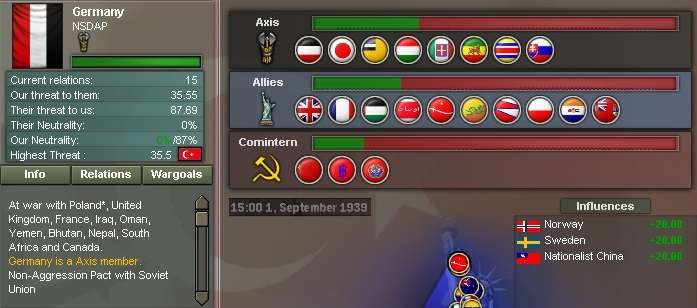
Hitler appeared before the Reichstag soon after 10pm to explain his decision. Those in the audience who didn't notice that Hitler was wearing a field-grey uniform instead of his usual brown jacket would have done so after he declared toward the end: “From now on I am just the first soldier of the German Reich. I have once more put on that coat that was the most sacred and dear to me. I will not take it off again until victory is assured, or I will not survive the outcome.”
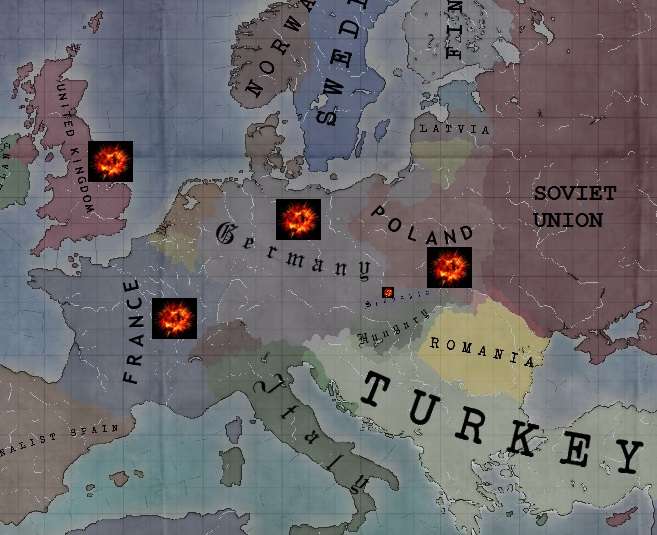
Europe, 1 Sep 39. So far, in Europe itself, the war is indeed limited: Germany and its puppet Slovakia, against Poland and its British and French allies. Though already large, it is not a global war by any stretch. The miscellaneous non-European Allied faction members do not yet make it so. And the only land fighting of any note is on the German-Polish border.
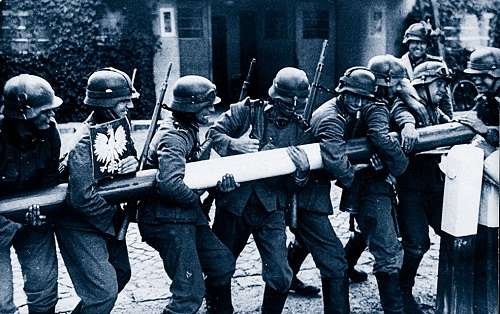
As fighting erupts along the border, German troops take part in their traditional border-crossing dismantling ritual. Although this time, their adversary has chosen to fight. There must be an enormous stash of looted border boom-gates somewhere in a Reich warehouse. And probably a Reichskommissioner for them as well!
A series of other countries from both neutrals (though pro-Allied) and the Axis bloc begin mobilising, though none join in the war yet. The first to jump on the bandwagon is, of course, Ethiopia (Italy’s puppet)!
2 Sep 39
Fighting intensifies along the Polish border. Air raids are occurring, but we have no detailed reports as yet. We are not expecting the first comprehensive battlefield summaries from our observers for a few days yet and their focus will be on land dispositions. But the events in Poland have other smaller countries on Germany’s border worried – they start mobilising too.
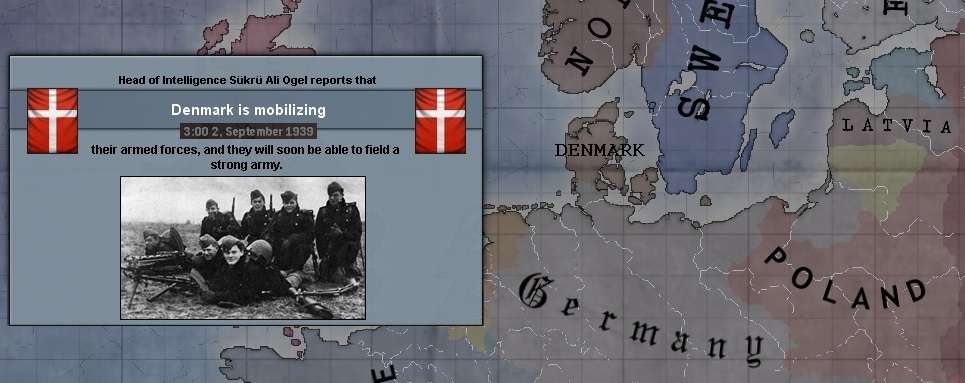
As Americans get their morning papers, the momentous news of the night before is plastered all over them. Danzig may have been ‘accepted into the Reich’, but the province still holds out against the Nazi aggressor.
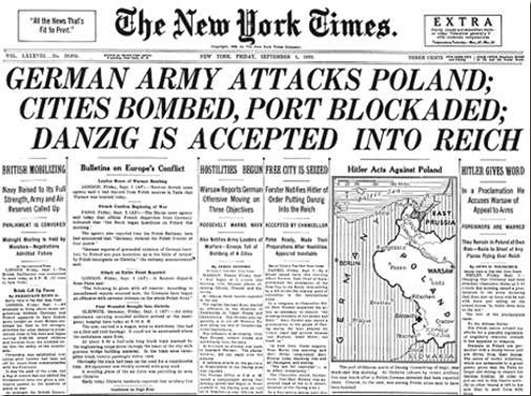
Foreign Minister Aras reports that the predictions about the threat effect of Axis aggression have been fulfilled: the Axis threat has gone through the roof, with the power of Comintern alignment almost doubled over night. The people of the Glorious Union now see the Fascist menace for what it is. Even if Japan does try to peddle its lies again, it will not have the same net effect as before, while Comintern alignment should progress very smartly now.
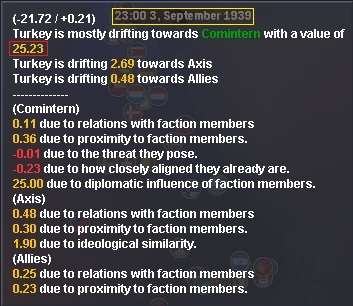
3 Sep 39
Japan now mobilises, but it remains to be seen whether this will translate into their joining the fight any time soon. Kaya and Ögel get out their Japanese Cabinet dartboard and challenge each other to a ‘best of three’ match.
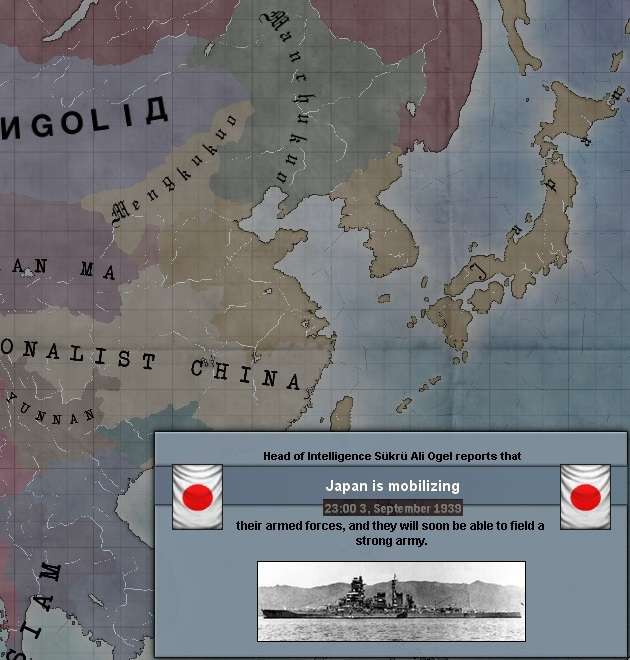
(1.24)
The news war has begun on both sides of the fight.
4 Sep 39
We receive our first direct battlefield report. One of our observers with the Polish 1st Army Group Headquarters in Kraków (FM Bittner – SK1) was forward with the Polish 11th Division (MAJGEN Podhorski SK2) in the border city of Katowice. After a fierce battle, the Poles won a brave but costly victory against more than three times their number of German attackers. However, to the south-west, the divisional commander reports his left flank is wide open – a three-province gap in front of Krakow, through which German infantry and at least one light Panzer division are pouring.
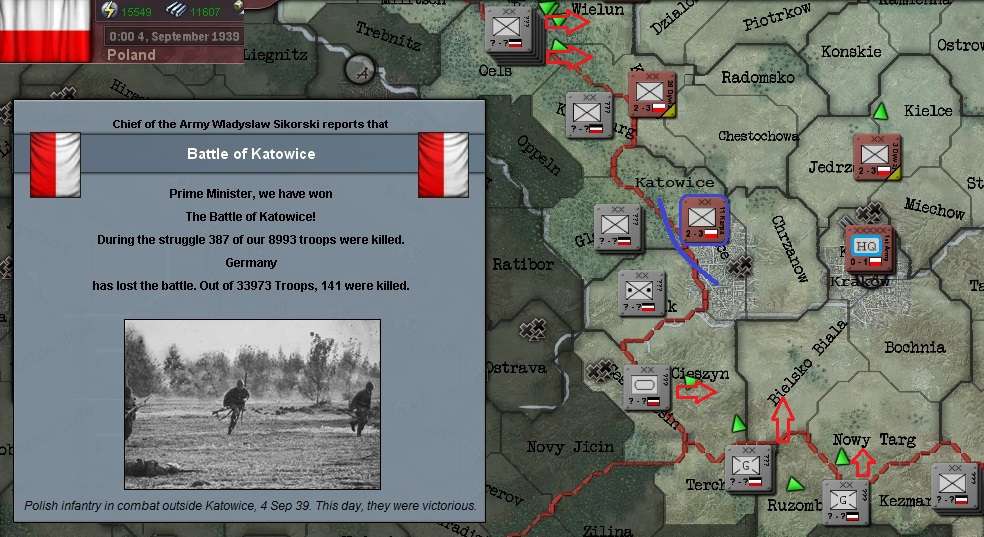
Further to the north, our observer with Armia Poznan (commanded by the Polish GEN Rómmel SK1) reports the Germans are attacking in heavy force to the north and south of Poznan, with the thinly-held Polish line giving way. Reports from East Prussia are more optimistic, where Polish forces are on the offensive. But while that may boost morale, the war is not going to be won there. To the right of 11th Division, the Polish 28th Division reports a massive German concentration pouring into Wielun on its right. The Polish border cannot possibly be held under these circumstances. The question remains as to whether additional forces from the east can support a fighting withdrawal in the west, though there is no useful river line to defend in the Krakow sector facing west – only south.
Later that morning, Belgium is the next of Germany’s neighbours to get worried and mobilise.
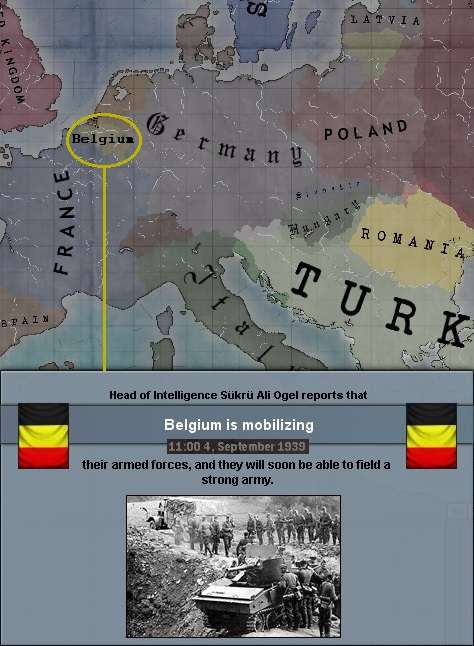
Germany exercises the Blitzkrieg Decision: the decision reduces German neutrality by 20 (it was already at zero), increases manpower by 200, and gives "revenge" modifier for 300 days. This modifier increases combat movement speed by 20%, organisation regain by 20%, and soft attack by 20%.
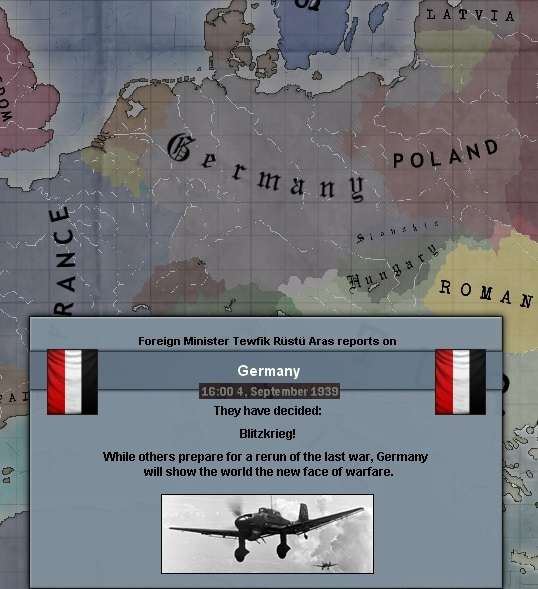
[Ed: OK, Germany gets this, Russia gets a couple of decisions to boost various factors, including manpower – like they need it! This gets the Turkish general staff and government thinking – doesn’t seem fair. The Glorious Union should also get some assistance under similar circumstances, such as being attacked by a major power, after certain cities (or % of them) fall, etc. Not unfairly, now, but when drastically threatened. Thoughts? I know some contributors have suggested adding MP in the past and I have said I wouldn’t do that. But – not as an advance grab, but under similar circumstances (scaled down) for the Turkish Motherland … Thoughts? Would people think I’ve betrayed my high ideals by introducing some commensurate events for Turkey? If you think Turkey should get something along these lines too, I have some initial ideas, but would welcome suggestions that imitate what my competitors receive, on a scale plausible for a large regional power?]
7 Sep 39
Both these reports are at received at 0100: they represent the known situation at nightfall the day before (6 Sep).
A more detailed report on the Franco-German border shows a bit of movement but no attacking by either side. Looks like Poland may be getting hung out to dry. The German side of the line looks well garrisoned and fortified.
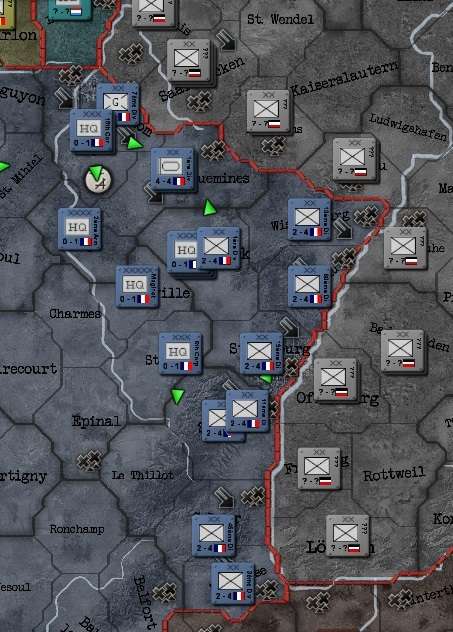
The first six days of fighting in Poland show the Germans already making inroads. Katowice has now fallen after earlier gallant resistance and Krakow is under direct threat from fast-moving German panzers. Poznan holds out, but German thrusts to its north and south will soon have it outflanked, with the danger of a pocket forming if the Polish do not escape in time. Another Panzer division is racing through in the south, in the large gap between Krakow and Lwow, with nothing nearby to stop them and the troops following up. In East Prussia, our observer with Armia Modlin (GEN Kurtrzeba SK1) advises a Polish advance in the centre has taken three provinces and is heading towards Königsberg. The first Polish divisions from their eastern border can be seen approaching central Poland, but it looks like it could be too little, too late. Danzig still holds out in the north.
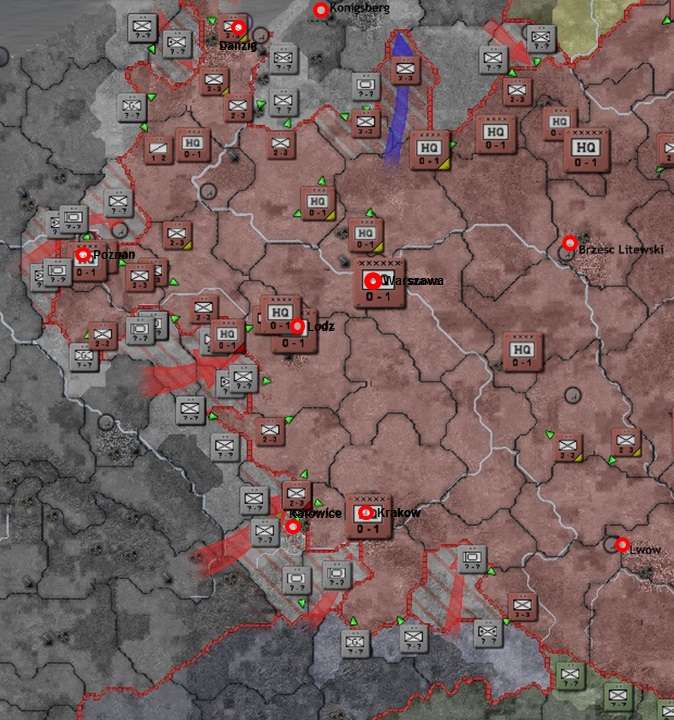
Two contrasting battle reports tell the story of the first few days of the Battle of the Border. By now, Poznan itself is under heavy assault by 5 Pz Div, commanded by MAJGEN Model (SK5) with 7 Pz Div in reserve. GEN Rómmel (the Polish version, SK1) is clearly completely outmatched by Model and his Masterful Breakthrough. While the Polish 13th Div fights bravely, this isn’t going to last long.
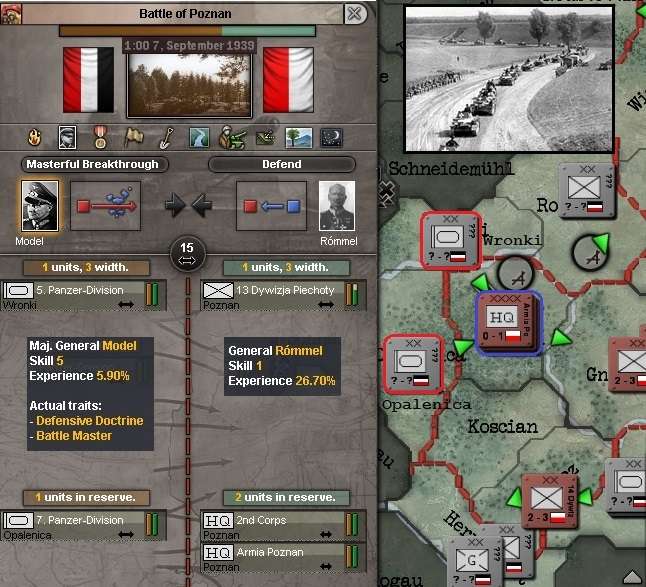
Inset: Armoured column from the German 5 Pz Div heads towards Poznan, 6 Sep 39.
Meanwhile, in the north (on the border with East Prussia) a German attack on Augustow is meeting more resistance, though even there the pressure is telling. The main German strength (in numbers and armour) is clearly on the decisive Western border, while Poland looks just too weak there to provide much resistance for now. And by the time the eastern army arrives, the Germans will be streaming through and the Poles trying to construct hasty defences (without fortifications or entrenchments). Sadly, this looks more like a matter of days than weeks before Germany is victorious.
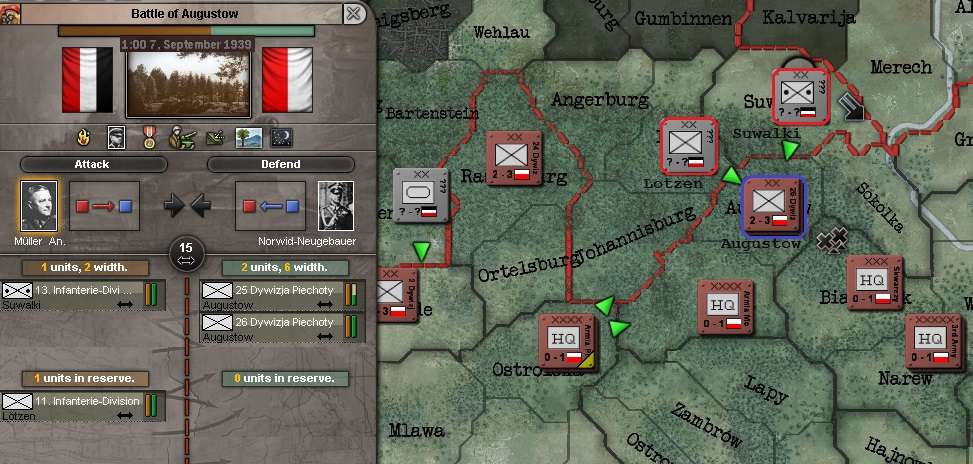
Coming Up: with the eyes of the world on Poland, we will trace the progress of the Nazi’s war of aggression. So far, on the French border, there is no indication of even a diversionary attack by France to try to distract the Germans – whose defences look quite solid in any case. It looks like it will soon be too late for Poland – it may already be so. Turkey for now sails under the newly invented ‘radar’ (a technology of which we have heard reports but do not have), working on its plans for defence against a threat that looks just as imposing as we had feared. Undaunted, the campaign to align to the Comintern and thereby gain the option of having a first line major power ally continues apace – so far without renewed Japanese interference. And will the Government prepare to enact wartime mobilisation laws to grant a manpower boost in case of armed attack or the loss of key territory to an aggressor? [Ed: That is, engineer some mock events to be enacted if such happens – advice sought from my valued readership.]
[Ed: I forgot I had stopped at 30 rather than 31 Aug in the last issue. It allows for some last-minute diplomacy, mainly between Britain and Germany, to be conducted. Alas, in vain. The inevitable hammer will soon fall heavily on our brave Polish friends.]
31 Aug 39 – War’s Eve
The final tracks are laid for the new Ankara-Adana Railway upgrade in the very early hours of 31 Aug. A later project would be to improve communication links across to Iran, but that will have to wait for now. For now, the urgent construction of additional air defences continues, as it will be a long time before we are likely to have access to decent fighter licenses.

British Ambassador Nevile Henderson has flown back to Berlin late the night before with his government's official position on Poland, which he presents to Hitler first thing [in this ATL] on the morning of Thursday 31 August. As relayed by our French network, Britain is prepared to take Hitler's proposals as “subjects for discussion” and agrees there must be settlement of differences between Germany and Poland, but notes that everything turned “upon the nature of the settlement and the method by which it is to be reached.” Germany is reminded that “His Majesty's Government have obligations to Poland by which they are bound and which they intend to honour. They could not, for any advantage offered to Great Britain, acquiesce in a settlement which put in jeopardy the independence of a State to whom they have given their guarantee.”
Britain suggests the next step “should be the initiation of direct discussions between the German and Polish Governments on a basis which would include the principles stated above, namely, the safeguarding of Poland's essential interests and the securing of the settlement by an international guarantee.” The reply concludes with a warning that failure to reach a settlement “would ruin the hopes of better understanding between Germany and Great Britain, would bring the two countries into conflict, and might well plunge the whole world into war. Such an outcome would be a calamity without parallel in history.”
Hitler reads a German translation of the British government's note and tells Henderson he is willing to negotiate, but Poland could not be reasonable. Henderson firmly replies that Hitler would have to choose between war with Poland or friendship with Britain. Hitler says he would prepare a written reply of his own.
Hitler's reply to Britain arrives later that morning. He demands the return of Danzig and the Polish Corridor and writes that Germany could “no longer share” Britain's view that “these grave differences can be resolved by way of direct negotiations.” Despite this, Hitler writes, Germany is prepared to enter direct discussions “to give the British Government and the British nation a proof of the sincerity of Germany's intentions to enter into a lasting friendship with Great Britain.”
Nevile Henderson hands German Foreign Minister Constantin von Neurath the British government's reply that afternoon. “His Majesty's Government repeat that they reciprocate the German Government's desire for improved relations, but it will be recognised that they could not sacrifice the interests of other friends in order to obtain that improvement”, the note explains. “They fully understand that the German Government cannot sacrifice Germany's vital interests, but the Polish Government are in the same position and His Majesty's Government believe that the vital interests of the two countries are not incompatible.” The note expresses “reservation in regard to the statement of the particular demands put forward” by Germany, but says the German proposals would be “fully examined” during discussions.
Clearly, some time that evening Hitler issued orders to attack Poland the next day. At 6.15pm German Foreign Minister von Neurath meets with Polish ambassador Józef Lipski, more than five hours after Lipski had requested an audience. Lipski says the Polish government would be making a formal reply about direct negotiations in the next few hours. Neurath asks him if he is empowered to negotiate, and when Lipski replies that for the time being he is not, Neurath dismisses him. Lipski returns to the embassy and finds that his telephone line has been cut.
Later that night, in a false flag operation, Nazis posing as Poles seize the Gleiwitz radio station and broadcast an anti-German message in Polish (there will be other false flag operations the next day: they must have studied Turkey’s invasion of Bulgaria in 1937, right at the start of the Great Expansion). At 2100, German radio interrupts regular programming to present the government's 16-point proposal for Poland. The demand for the restoration of Danzig to the Reich is maintained, but the question of the Polish Corridor is now to be settled by a plebiscite. Warsaw never heard the proposal because communications between the two countries had been cut off. And by then, German forces were already deploying into their starting off positions on the Polish border anyway. It was all for show.
This Means War! More “Marxist Propaganda” from the Turkish Communications team.
Reports come in late that night from our observers in Poland and our network of agents in France. The key dispositions of forces are shown below – as it happens, the day before war is declared.

It transpires that Poland’s forces are fairly evenly distributed between their Soviet and German border areas (including East Prussia in the latter). While this may be a prudent reaction to the Nazi-Soviet Pact and the direct threat posed by the Soviets, it means that Poland is already paying the penalty for a two-front war. If Germany attacks first, those forces in the east will take a long time to be deployed to the west. Almost all the Polish units are ‘triangular’ infantry divisions with 3xINF each. There don’t seem to be any support (artillery, AT or AA) brigades among them. There are a few scattered cavalry divisions, but no visible armoured units. While it is hard to tell the full strength of the German units deployed on the border, there is a decent number of mechanised units in evidence.

Dispositions are a bit clearer on this map of the Polish-German border. The Polish line looks very porous, while concentrations of German panzers and motorised units can be seen north and south of the Poznan salient and further to the south, near the Slovakian border and poised to strike towards Katowice and Krakow. Only on the central portion of the border with East Prussia (north of Warsaw )does the Polish Army seem to outnumber its adversaries.

Concentrations of troops are not easily discernible in this map, but the Maginot Line – which stretches up to the Belgian border – is continuously manned. French forces are also poised along the Belgian border, but that country remains neutral and the French-Belgian border unfortified. Although Belgium has mobilised, it will be a race to see whether (if the neutral country is attacked, as it was in the Great War) it can hold its relatively short border with Germany long enough for the French to reinforce and hold it.

This more detailed map of the Franco-Italian border shows the southern (less heavily fortified but mountain-based) version of the Maginot Line is held mainly by a screen of elite mountain divisions. Similarly specialised Italian units face them.
1 Sep 39 – The Second Great War begins
The German invasion of Poland begins at 3pm. The Luftwaffe begins bombing raids on airfields, ships and troops. The first shots of the Second Great War (GW2) are fired. The series of battles collectively known as the Battle of the Border begin in Poland. There is no action on the Franco-German border.

News Report: Berlin, Germany. Adolf Hitler broadcasts his declaration of war to the Wehrmacht at 1440: “The Polish state has refused the peaceful settlement of relations which I desired and appealed to arms”, Hitler declares. “In order to put an end to this lunacy I have no other choice than to meet force with force from now on. The German Army will fight the battle for the honour and the vital rights of a newborn Germany with hard determination.”
Intelligence Report, Rome Italy. As expected, Benito Mussolini orders his ambassador in Berlin to ask for a telegram releasing Italy from any obligation to take part in the war. At 2000 Hitler obliges with a cordial telegram saying he did not “expect to need Italy's military support in these circumstances.” They will remain neutral – for now, anyway.
News Report: London, UK. Neville Chamberlain announces on BBC Radio that Britain and Germany were at war [no delays for ultimatums etc in this ATL – straight into it, as with the Allies ‘an attack on one is an attack on all’.] “You can imagine what a bitter blow it is to me that all my long struggle to win peace has failed", Chamberlain says, sounding dispirited. “Yet I cannot believe that there is anything more or anything different that I could have done and that would have been more successful ... We and France are today, in fulfilment of our obligations, going to the aid of Poland, who is so bravely resisting this wicked and unprovoked attack upon her people. We have a clear conscience. We have done all that any country could do to establish peace, but a situation in which no word given by Germany's ruler could be trusted and no people or country could feel themselves safe had become intolerable. And now that we have resolved to finish it, I know that you will all play your part with calmness and courage.”
Neville Chamberlain addressed the House that evening and called it “a sad day for all of us, and to none is it sadder than to me. Everything that I have worked for, everything that I have hoped for, everything that I have believed in during my public life, has crashed into ruins. There is only one thing left for me to do; that is, to devote what strength and powers I have to forwarding the victory of the cause for which we have to sacrifice so much. I cannot tell what part I may be allowed to play myself; I trust I may live to see the day when Hitlerism has been destroyed and a liberated Europe has been re-established.”
Winston Churchill agreed that it was a sad day, but said “at the present time there is another note which may be present, and that is a feeling of thankfulness that, if these great trials were to come upon our Island, there is a generation of Britons here now ready to prove itself not unworthy of the days of yore and not unworthy of those great men, the fathers of our land, who laid the foundations of our laws and shaped the greatness of our country. This is not a question of fighting for Danzig or fighting for Poland. We are fighting to save the whole world from the pestilence of Nazi tyranny and in defence of all that is most sacred to man.”
A King’s Speech. At 9pm, King George VI addressed the British Empire by radio. “For the second time in the lives of most of us we are at war”, the King said. “Over and over again we have tried to find a peaceful way out of the differences between ourselves and those who are now our enemies. But it has been in vain ... The task will be hard. There may be dark days ahead and war is no longer confined to the battlefield but we can only do the right as we see the right and reverently command our cause to God. If one and all be resolutely faithful today, ready for whatever service and sacrifice it may demand, with God's help we shall prevail.”
News Report: Washington DC, US. President Franklin D. Roosevelt says at a press conference that “every effort” would be made by his administration to stay out of the war.
So, as Hitler predicted this will start as a limited, if not localised war. Germany and its puppet Slovakia are at war with the entire Allied faction. Their non-aggression pact with the Soviets is in force.

Hitler appeared before the Reichstag soon after 10pm to explain his decision. Those in the audience who didn't notice that Hitler was wearing a field-grey uniform instead of his usual brown jacket would have done so after he declared toward the end: “From now on I am just the first soldier of the German Reich. I have once more put on that coat that was the most sacred and dear to me. I will not take it off again until victory is assured, or I will not survive the outcome.”
The Turkish Government, Armed Forces and People hope to hold Hitler to that promise and see him die in that field-grey uniform. But if that is to happen, many lives, much treasure and untold suffering are likely to be the cost. First, we will see if the gallant Poles, supported by their bold French and British allies who will undoubtedly rush to their aid while Germany is occupied in the east, can put Hitler back in his place. Though their early dispositions and the reputed might of the Wehrmacht suggest there is not much time to save them.

Europe, 1 Sep 39. So far, in Europe itself, the war is indeed limited: Germany and its puppet Slovakia, against Poland and its British and French allies. Though already large, it is not a global war by any stretch. The miscellaneous non-European Allied faction members do not yet make it so. And the only land fighting of any note is on the German-Polish border.

As fighting erupts along the border, German troops take part in their traditional border-crossing dismantling ritual. Although this time, their adversary has chosen to fight. There must be an enormous stash of looted border boom-gates somewhere in a Reich warehouse. And probably a Reichskommissioner for them as well!
A series of other countries from both neutrals (though pro-Allied) and the Axis bloc begin mobilising, though none join in the war yet. The first to jump on the bandwagon is, of course, Ethiopia (Italy’s puppet)!
2 Sep 39
Fighting intensifies along the Polish border. Air raids are occurring, but we have no detailed reports as yet. We are not expecting the first comprehensive battlefield summaries from our observers for a few days yet and their focus will be on land dispositions. But the events in Poland have other smaller countries on Germany’s border worried – they start mobilising too.

As Americans get their morning papers, the momentous news of the night before is plastered all over them. Danzig may have been ‘accepted into the Reich’, but the province still holds out against the Nazi aggressor.

Foreign Minister Aras reports that the predictions about the threat effect of Axis aggression have been fulfilled: the Axis threat has gone through the roof, with the power of Comintern alignment almost doubled over night. The people of the Glorious Union now see the Fascist menace for what it is. Even if Japan does try to peddle its lies again, it will not have the same net effect as before, while Comintern alignment should progress very smartly now.

3 Sep 39
Japan now mobilises, but it remains to be seen whether this will translate into their joining the fight any time soon. Kaya and Ögel get out their Japanese Cabinet dartboard and challenge each other to a ‘best of three’ match.

The news war has begun on both sides of the fight.
4 Sep 39
We receive our first direct battlefield report. One of our observers with the Polish 1st Army Group Headquarters in Kraków (FM Bittner – SK1) was forward with the Polish 11th Division (MAJGEN Podhorski SK2) in the border city of Katowice. After a fierce battle, the Poles won a brave but costly victory against more than three times their number of German attackers. However, to the south-west, the divisional commander reports his left flank is wide open – a three-province gap in front of Krakow, through which German infantry and at least one light Panzer division are pouring.

Further to the north, our observer with Armia Poznan (commanded by the Polish GEN Rómmel SK1) reports the Germans are attacking in heavy force to the north and south of Poznan, with the thinly-held Polish line giving way. Reports from East Prussia are more optimistic, where Polish forces are on the offensive. But while that may boost morale, the war is not going to be won there. To the right of 11th Division, the Polish 28th Division reports a massive German concentration pouring into Wielun on its right. The Polish border cannot possibly be held under these circumstances. The question remains as to whether additional forces from the east can support a fighting withdrawal in the west, though there is no useful river line to defend in the Krakow sector facing west – only south.
Later that morning, Belgium is the next of Germany’s neighbours to get worried and mobilise.

Germany exercises the Blitzkrieg Decision: the decision reduces German neutrality by 20 (it was already at zero), increases manpower by 200, and gives "revenge" modifier for 300 days. This modifier increases combat movement speed by 20%, organisation regain by 20%, and soft attack by 20%.

[Ed: OK, Germany gets this, Russia gets a couple of decisions to boost various factors, including manpower – like they need it! This gets the Turkish general staff and government thinking – doesn’t seem fair. The Glorious Union should also get some assistance under similar circumstances, such as being attacked by a major power, after certain cities (or % of them) fall, etc. Not unfairly, now, but when drastically threatened. Thoughts? I know some contributors have suggested adding MP in the past and I have said I wouldn’t do that. But – not as an advance grab, but under similar circumstances (scaled down) for the Turkish Motherland … Thoughts? Would people think I’ve betrayed my high ideals by introducing some commensurate events for Turkey? If you think Turkey should get something along these lines too, I have some initial ideas, but would welcome suggestions that imitate what my competitors receive, on a scale plausible for a large regional power?]
7 Sep 39
Both these reports are at received at 0100: they represent the known situation at nightfall the day before (6 Sep).
A more detailed report on the Franco-German border shows a bit of movement but no attacking by either side. Looks like Poland may be getting hung out to dry. The German side of the line looks well garrisoned and fortified.

The first six days of fighting in Poland show the Germans already making inroads. Katowice has now fallen after earlier gallant resistance and Krakow is under direct threat from fast-moving German panzers. Poznan holds out, but German thrusts to its north and south will soon have it outflanked, with the danger of a pocket forming if the Polish do not escape in time. Another Panzer division is racing through in the south, in the large gap between Krakow and Lwow, with nothing nearby to stop them and the troops following up. In East Prussia, our observer with Armia Modlin (GEN Kurtrzeba SK1) advises a Polish advance in the centre has taken three provinces and is heading towards Königsberg. The first Polish divisions from their eastern border can be seen approaching central Poland, but it looks like it could be too little, too late. Danzig still holds out in the north.

Two contrasting battle reports tell the story of the first few days of the Battle of the Border. By now, Poznan itself is under heavy assault by 5 Pz Div, commanded by MAJGEN Model (SK5) with 7 Pz Div in reserve. GEN Rómmel (the Polish version, SK1) is clearly completely outmatched by Model and his Masterful Breakthrough. While the Polish 13th Div fights bravely, this isn’t going to last long.

Inset: Armoured column from the German 5 Pz Div heads towards Poznan, 6 Sep 39.
Meanwhile, in the north (on the border with East Prussia) a German attack on Augustow is meeting more resistance, though even there the pressure is telling. The main German strength (in numbers and armour) is clearly on the decisive Western border, while Poland looks just too weak there to provide much resistance for now. And by the time the eastern army arrives, the Germans will be streaming through and the Poles trying to construct hasty defences (without fortifications or entrenchments). Sadly, this looks more like a matter of days than weeks before Germany is victorious.

Coming Up: with the eyes of the world on Poland, we will trace the progress of the Nazi’s war of aggression. So far, on the French border, there is no indication of even a diversionary attack by France to try to distract the Germans – whose defences look quite solid in any case. It looks like it will soon be too late for Poland – it may already be so. Turkey for now sails under the newly invented ‘radar’ (a technology of which we have heard reports but do not have), working on its plans for defence against a threat that looks just as imposing as we had feared. Undaunted, the campaign to align to the Comintern and thereby gain the option of having a first line major power ally continues apace – so far without renewed Japanese interference. And will the Government prepare to enact wartime mobilisation laws to grant a manpower boost in case of armed attack or the loss of key territory to an aggressor? [Ed: That is, engineer some mock events to be enacted if such happens – advice sought from my valued readership.]
Last edited:
- 1
- 1
The final tracks are laid for the new Ankara-Adana Railway upgrade in the very early hours of 21 Aug.
Rumours that many in the Turkish leadership have dubbed it the 'escape to victory' line have been viciously denied and suppressed by the government.
Hitler obliges with a cordial telegram saying he did not “expect to need Italy's military support in these circumstances.”
Rumours that many in the German leadership overheard Hitler commenting: "As if we would ask them for help!" have been viciously denied and suppressed by the government.
I will not take it off again until victory is assured, or I will not survive the outcome.”
Rumours that many in the British leadership took up Hitler's proposal and sent assurances that soon they would get him measured for a lead overcoat to go with his uniform...have been somewhat half-heartedly denied until Churchill made a speech proudly admitting he had sent three such telegrams already. Whether the government is thinking of suppressing him or not is unknown at this time.
- 1
[Ed: OK, Germany gets this, Russia gets a couple of decisions to boost various factors, including manpower – like they need it! This gets the Turkish general staff and government thinking – doesn’t seem fair the Glorious Union should also get some assistance under similar circumstances, such as being attacked by a major power, after certain cities (or % of them) fall or, etc. Not unfairly, now, but when drastically threatened. Thoughts? I know some contributors have suggested adding MP in the past and I have said I wouldn’t do that. But – not as an advance grab, but under similar circumstances (scaled down) for the Turkish Motherland … Thoughts? Would people think I’ve betrayed my high ideals by introducing some commensurate events for Turkey? If you think Turkey should get something along these lines too, I have some initial ideas, but would welcome suggestions that imitate what my competitors receive, on a scale plausible for a large regional power?]
For what it's worth, in the HPP mod even the smallest countries have the option through various draft or mobilization laws to gain a large boost to their manpower in times of war or crisis - so there is a reasonable precedent, and it is much-needed given how badly Paradox screwed over the minor powers in terms of manpower.
Turkey is certainly no minor power by this time, so I'd consider such an event or "cheat" more than fair. I can also add from my experience with vanilla (invading a zero-manpower Germany as the USA is really quite boring) that it will probably make both the game and AAR much more interesting than watching you struggle to retreat...erm, advance rearwards unto glory, once your MP runs out and a stiff breeze is enough to take Turkish provinces by the dozen.
As a rough estimate - I would consider the following fair: ~100 manpower from a national draft when war begins for Turkey, and perhaps 500-1000 manpower if several major cities (e.g. Istanbul, Ankara) were to fall and Turkey was mounting a desperate defense, justified by an emergency national draft of some sort.
- 1
Many thanks, very helpful. I might look at a graduated series of events and use HPP to gauge what kind of proportions might be reasonable. I think the Cabinet will need to meet on this question once they see what unfolds in Poland.For what it's worth, in the HPP mod even the smallest countries have the option through various draft or mobilization laws to gain a large boost to their manpower in times of war or crisis - so there is a reasonable precedent, and it is much-needed given how badly Paradox screwed over the minor powers in terms of manpower.
Turkey is certainly no minor power by this time, so I'd consider such an event or "cheat" more than fair. I can also add from my experience with vanilla (invading a zero-manpower Germany as the USA is really quite boring) that it will probably make both the game and AAR much more interesting than watching you struggle to retreat...erm, advance rearwards unto glory, once your MP runs out and a stiff breeze is enough to take Turkish provinces by the dozen.
As a rough estimate - I would consider the following fair: ~100 manpower from a national draft when war begins for Turkey, and perhaps 500-1000 manpower if several major cities (e.g. Istanbul, Ankara) were to fall and Turkey was mounting a desperate defense, justified by an emergency national draft of some sort.
- 1
Rumours that many in the Turkish leadership have dubbed it the 'escape to victory' line have been viciously denied and suppressed by the government.
Rumours that many in the German leadership overheard Hitler commenting: "As if we would ask them for help!" have been viciously denied and suppressed by the government.
Rumours that many in the British leadership took up Hitler's proposal and sent assurances that soon they would get him measured for a lead overcoat to go with his uniform...have been somewhat half-heartedly denied until Churchill made a speech proudly admitting he had sent three such telegrams already. Whether the government is thinking of suppressing him or not is unknown at this time.
If we thought it would work, Inonu might have asked Cennet to deliver Hitler a nice box of baklava! Alas, Darth Kelebek does not seem interested in intervening in this case - he mutters something about "being interested in how these human meat-sacks deal with this turn of events" and says he will be taking a sabbatical for a while to "somewhere a bit warmer", as if Istanbul in summer isn't warm enough!
A S.I.T.H. operative thought he heard maniacal cackling from The Red Butterfly's office one night. The next morning he had left, without anyone having seen him go. A strange one, that. I'm sure he will be taking a keen interest in the great conflict that has just started - perhaps he has gone for a battlefield tour? Or Mt Etna for a brimstone rest cure.
- 1
Sadly, I doubt I will be able to catch up on your entire story in a long time. Instead for now I'll take a look at the last few chapters and try to follow it from here (When I get back from a week-long trip, that is.). I might be getting myself into reading too many AARs right now, so don't worry if I don't comment; It doesn't mean that I don't keep an eye on your work.
Anyway, enough of that. Great job so far, on the narrative, the war reporting, the pictures... everything!
I would side with either choice, since Turkey is a very fresh regional power and should not yet be strongly consolidated, but when you have reached this far it might be more fun to see you put up a good fight against the Axis.
Anyway, enough of that. Great job so far, on the narrative, the war reporting, the pictures... everything!
[Ed: OK, Germany gets this, Russia gets a couple of decisions to boost various factors, including manpower – like they need it! This gets the Turkish general staff and government thinking – doesn’t seem fair the Glorious Union should also get some assistance under similar circumstances, such as being attacked by a major power, after certain cities (or % of them) fall or, etc. Not unfairly, now, but when drastically threatened. Thoughts? I know some contributors have suggested adding MP in the past and I have said I wouldn’t do that. But – not as an advance grab, but under similar circumstances (scaled down) for the Turkish Motherland … Thoughts? Would people think I’ve betrayed my high ideals by introducing some commensurate events for Turkey? If you think Turkey should get something along these lines too, I have some initial ideas, but would welcome suggestions that imitate what my competitors receive, on a scale plausible for a large regional power?]
I would side with either choice, since Turkey is a very fresh regional power and should not yet be strongly consolidated, but when you have reached this far it might be more fun to see you put up a good fight against the Axis.
- 1
A S.I.T.H. operative thought he heard maniacal cackling from The Red Butterfly's office one night. The next morning he had left, without anyone having seen him go. A strange one, that. I'm sure he will be taking a keen interest in the great conflict that has just started - perhaps he has gone for a battlefield tour? Or Mt Etna for a brimstone rest cure.
Huh...fortuitous comment again...
He's actually helping an orphaned dwarf take back his family's rightful place as Doge of Venice. Though he intended it to be a humorous little side piece (to...erm...this already rather large side piece), he's rapidly come to the conclusion that, should the short life of Cosma Boi ever come to light it would be viewed more as a tragedy, and a sad one at that.
- 1
Thanks for the comments - appreciate it. Good just to know you're thereSadly, I doubt I will be able to catch up on your entire story in a long time. Instead for now I'll take a look at the last few chapters and try to follow it from here (When I get back from a week-long trip, that is.). I might be getting myself into reading too many AARs right now, so don't worry if I don't comment; It doesn't mean that I don't keep an eye on your work.
Anyway, enough of that. Great job so far, on the narrative, the war reporting, the pictures... everything!
I would side with either choice, since Turkey is a very fresh regional power and should not yet be strongly consolidated, but when you have reached this far it might be more fun to see you put up a good fight against the Axis.
- 1
Let's hope it's not a 'poison dwarf'!Huh...fortuitous comment again...
He's actually helping an orphaned dwarf take back his family's rightful place as Doge of Venice. Though he intended it to be a humorous little side piece (to...erm...this already rather large side piece), he's rapidly come to the conclusion that, should the short life of Cosma Boi ever come to light it would be viewed more as a tragedy, and a sad one at that.
- 1
The Story So Far - Some Highlights
The Story So Far - Some HighlightsSadly, I doubt I will be able to catch up on your entire story in a long time. Instead for now I'll take a look at the last few chapters and try to follow it from here.
(suggest using the table of contents in Ch 1 for navigation)
PS: if you want to have a look at a few useful scene setting chapters (and in case this may be of use to other newly arrived readers):
- Ch 16 (a & b) explains the broad strategy we're now living through
- For the Turkish Army in 'full swing' on the offensive (it hasn't always cowered behind defensive lines) of the Wars of Expansion, the War with Greece (Ch 12-22) is a good case study of early Turkish Rapid Aggressive Warfare (R.A.W.) doctrine. And has some desperate and close-run battles.
- Or later, and on a larger scale involving the support of our (by then) Romanian Ally is the War with Yugoslavia (Ch 30-38), which brings the New Balkan War and Book 1 to a close. There are pitched battles, pincer movements, pockets etc. Also, it is during this war that Luca Brasi establishes his reputation as a fearsome 'liaison officer' for the Turkish nation
!
- For more narrative diversions, you could look at The Apotheosis of Şükrü Âli Ögel (Ch 27) to find out more of our Intelligence Chief's back story and how it may relate to Goodfellas
!
- But for the zany diversions of Springtime for Hitler (based on The Producers, culminating in Ch 42, where Luca also has to deal with an insane cavalry brigade commander), or the darker Godfather universe of more recent episodes (recently concluded in Ch 60 with Blood Will Flow) you would need to pick up the plot line through successive chapters.
- Same with the expat advertising mercenaries Braanszon and Persephonee and their adventures with the Propaganda Department.
And with as much of the uncertainty of the time as I can portray, partly from taking a country with a 'non-standard' strategic position (and therefore many options), and also only playing ahead a chapter at a time, so I don't know what will happen next either. Which means any advice or commentary is current and often very helpful, and even allows contributors to become involved in the AAR as characters, to varying degrees.
Casual non-commenting readers are of course always very welcome. A brief 'hey just to let you know I'm subbed' and no obligation afterwards is always most welcome, or even just the occasional 'ping' with an 'Agree' which I will take as a 'thanks I just read that one', which is even easier
Last edited:
- 1
- 1
Chapter 64: Poland in Flames (7 to 14 September 1939)
Chapter 64: Poland in Flames (7 to 14 September 1939)
7 Sep 39
The Propaganda Department liked this poster from the British Daily Mirror. They will store it away for now, rather than producing a Turkish version for inclusion in the Istanbul Times and local Turkish-language papers. Hitler and the Nazis are still greatly disliked (even more so now), but given the sobering effect of what they are doing to Poland and how far away the hoped-for Soviet alliance remains, there is a degree of circumspection in the Turkish public propaganda at the moment.
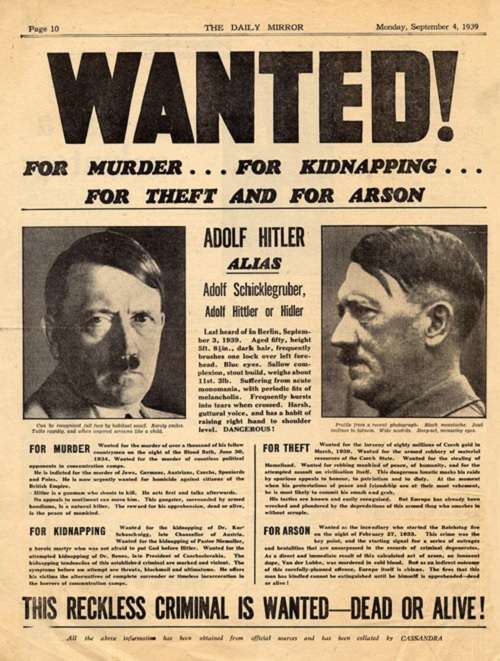
Cabinet Meeting. However, in Cabinet, the fate of poor Poland is being studied with great interest and not a little fear. While the General Staff cannot of course be sure, they believe Turkey may have enough troops to hold the Calistar Line indefinitely. But they definitely do not believe they have anything near enough to hold southern Greece. Nor the manpower reserves for future unit building plans such as a separate campaign to take advantage of any opportunities that may arise in the Middle East in the shorter term. Or indeed to start laying the foundations for the Great Counter Attack when (not if) the Soviet hordes succeed in defeating the Fascists (whenever that may be – no-one is counting on the Nazi-Soviet Non-aggression pact going its full term). Not to mention distant possibilities of continuing the victorious march of the Comintern across Europe and the world once Fascism has been defeated.
“We must mobilise the now considerable population of the Glorious Union more than we have done to date,” states President Inönü as he opens the meeting. As he is now also Armaments Minister, he is acutely aware of the brake the lack of manpower (and poor tank and aircraft technology) has put on Turkey’s plans. There is only so much infrastructure to be built – what we need is men.
“For now, the only alternative is the good old-fashioned infantry and artillery division for the offensive,” continues the President. “And they’re pretty useful for defence as well. Bayar,” he says, turning to the Prime Minister, “what can we do with legislation? I want to be able to mobilise more men as soon as possible, to build our forces further before war comes to us. But I realise there’s only so much we can do in peacetime. We should have further plans in place to trigger on the outbreak of war, and emergency plans for if we lose significant territory and must call up essential workers and others – who for reasons of age or fitness – may not be recruited to our frontline forces now. We should also take a leaf out of our Great President Atatürk’s book and ensure we can cover some of that increased mobilisation drain by bringing more women into the workforce, including in reserved occupations. It is the Motherland, after all!”
Bayar ponders this, then starts to form some suggestions. “First, as Cabinet has debated previously before I joined it, our current One-Year Draft laws are very inefficient. They actually decrease our manpower generation by 25%. Given our neutrality has long been at zero, we can bypass the Two-Year Draft and go straight to Three Years (which gives a 25% bonus) once our National Unity reaches 70%. Kaya advise it is currently very nearly at 68% and seems to be growing at around 0.1% per month. At that rate, 70% unity is still a way off - we’re more likely to be at war by then and able to impose Service by Requirement anyway (100% bonus). So, unless there is some way to dramatically boost National Unity now, we need more than Conscription Law reform. And also, that kind of accumulation is incremental – we need something larger and more immediate, as a ‘one-off’."
“Yes,” muses Inönü. He addresses the Chief of Staff next. “Örlungat, we all saw what the Germans did with that ‘Blitzkrieg Declaration’ of theirs a few days ago. They motivate the masses and got an immediate ‘sugar hit’ of 200 manpower! We need something like that.”
Örlungat confers with Fuad Calistar, who remains the Supreme (Theatre) Commander and still sits in Cabinet as Information Minister (including his beloved Propaganda Department). “Perhaps, in the short term, we can mount a patriotic campaign to mobilise some new recruits from our vast new Dominions. New units raised under that program can be given patriotic names derived from their Glorious National Republic roots. We could call new units raised under these provisions the ‘National Republican Guard’ and give them localised titles. The Balkans in particular can now see the Fascist threat up close: they may not all love us yet, but the Glorious Union is now looking better than the prospect of living under Nazi tyranny and they have seen the fresh examples of Czechoslovakia and Poland. It would only be a relatively modest recruiting drive given we’re not at war yet, but that should be say 10-12 Brigades worth (say around 40 MP).”
“Yes, good, I like it!” enthuses Inönü. “For many of our poorer Dominion citizens, the pay they will get in the Armed Forces will be significantly better that what they’re getting now and we can support that. What else can we do.”
“We can have a couple of emergency measures in place,” says Celal Bayar, who has been thinking while the others have been talking up their plan. “Once war comes, our manpower accumulation will of course start to grow quickly, but it is off a low base and we may soon find ourselves needing many reinforcements just to keep our units fighting and recovering from battle. That defence correspondent from the Istanbul Times, Nukeluru Slorepee, has had some good ideas recently. I think it would be very reasonable to declare a ‘Defend the Motherland’ edict if we go to war with a major power, which would allow us to call up non-mobilised reserve forces from across the UGNR. Slorepee seemed to think that might yield up to around 100 more MP.”
“Excellent, excellent! Let’s draw up plans for that and start identifying the members of this ‘Motherland Defence' program.” This is good, but Inönü still wants to consider the worst case. “This is not defeatism, but we have all lived through the dark days of the fall of the Ottoman Empire and the desperate fight against the Greeks that followed, when they almost seized Ankara. We will keep the following highly confidential, but we need to make more plans in case disaster befalls us. By then, the situation will be desperate enough to justify radical measures and the people will be motivated to resist imminent destruction and enslavement by godless Nazi oppressors. Let us draw up plans in case the defences of either Istanbul or Ankara fall and we must defend to Glory or Death." Perhaps both!
“Slorepee has done some private research on this eventuality, but our censors – very wisely – prevented him from publishing such alarmist analysis. It’s not like we have a free press that can publish anything it likes, no matter the danger to the Nation!” Bayar notes. Murmurs of ‘hear, hear’, ‘indeed not’ and ‘a good thing too’ echo around the table. “He thought that might generate another available 500 MP – which should keep our industry cranking out land forces for as long as we can sustain them. Though presumably losing the industrial base of the Balkans and Istanbul would put a large dent in our industrial potential. We can tap the manpower pool as necessary – they are not all going to be removed from the workforce at once, and we will ‘encourage’ military aged men from any overrun Balkan provinces to keep falling back to the Turkish heartland, where they can be used to augment this pool. We will simultaneously keep our industry and agriculture going, as we bring more women into the mainstream workforce.”
“Yes, good thinking. Perhaps we should start looking at building some more IC capacity in safe areas to replace what we may lose and be able to take advantage of any wartime manpower boosts? By then we may also be producing armour and air units once we can get decent licenses again from our Soviet brethren. We’ll have to give this Slorepee the traditional signed Atatürk photo and cash bonus. More than the 50 lira we normally give out.” Inönü is now in a better mood: Turkey never wants to be in a position where its major industrial centre, ancient capital and European toehold or current capital have been conquered, but if that were to happen, at least such measures can give hope for redemption and revenge. “If the dark day ever comes where we must enforce this program, we will rally the Motherland and the Glorious Union with the cry of “For Atatürk and Glorious Victory!”
Plans will now be set in place and the first public information campaign drawn up. Busy times beckon for Braanszon and Persephonee. Turkey will not be caught with its guard down!
8 Sep 39
In a major turning point for the war … Luxemburg mobilises! The report says the usual “soon they will have a strong army”, but that will be taken with a very large grain of salt in this case.
9 Sep 39
Led by the commander of the Polish 19th Div MAJGEN Oziewicz, and supported by 15th Div, Polish forces in the north continue to attack the Germans in East Prussia. Alas, in this battle, although hard pressed, the German 2nd Inf Div in Marienwerder is entrenched, fortified, has a river covering one flank and the better general. Not a recipe for easy Polish success, unfortunately, but maybe with superior numbers they will prevail – though for what would only be a costly and symbolic victory. Noteworthy are the German bomber wings which are very active in Polish skies.
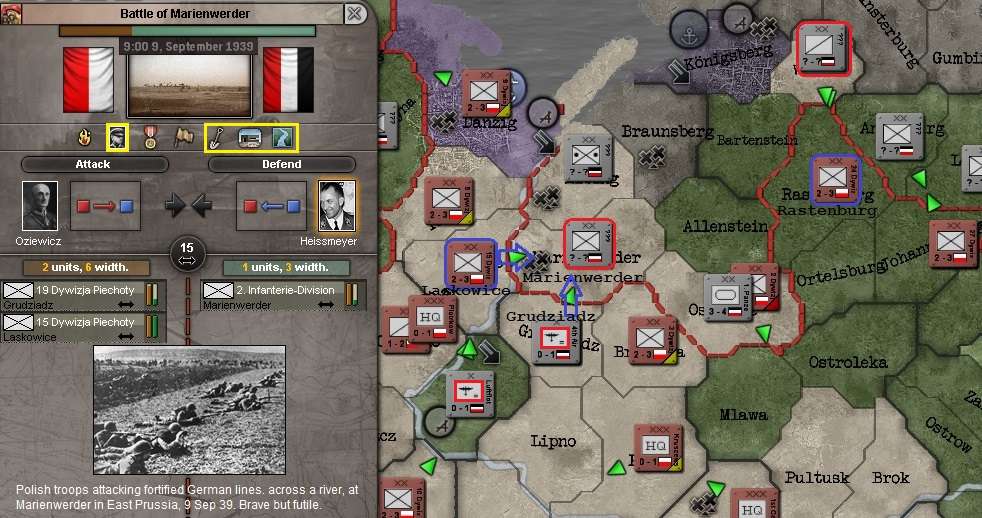
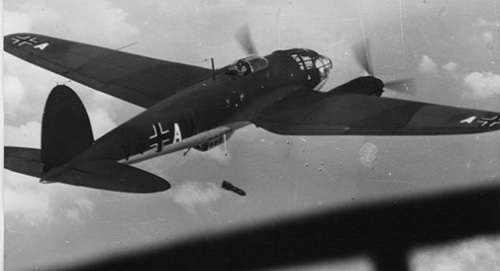
A German Heinkel He 111 bombing the Polish 19th Div in Grudziadz, 9 Sep 39.
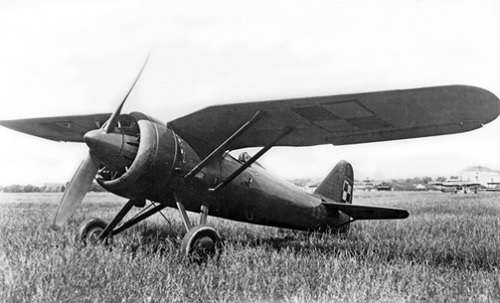
The Polish fighters have tried to contest the skies, but have been outnumbered and outperformed by their German adversaries. This is the Polish-built mainstay fighter, the PZL P11. Alas, many of them were caught like this in the first few days – on the ground. But they continue to survive and fight back where they can.
While the gallant but futile Battle for Marienwerder continues to the north, at 0900 Poznan falls to the Germans. While the significant forces there (a Corps HQ and three infantry divisions) fall back east to Gniezno, that province itself is also already under attack from the west and south, where the Polish 4th Div is trying to hold ground to enable their compatriots to escape. In Krepice to the south, 28th Div is also trying to retreat from an isolated position.
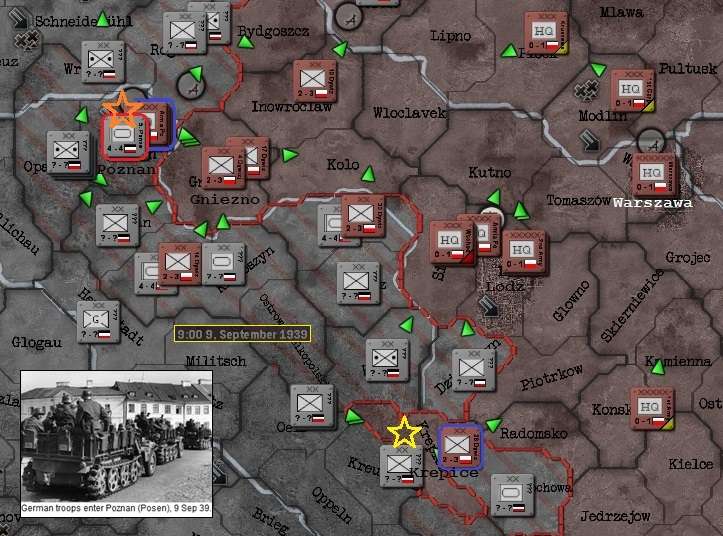
10 Sep 39
The enemy is still some distance from Warszawa, but bombing raids have begun. [Ed: the Germans here are a bit slower than in OTL – the siege of Warsaw had begun by 8 Sep.]
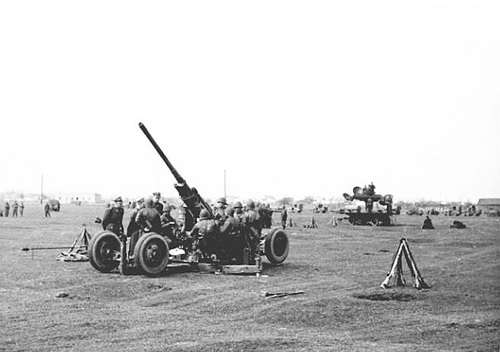
Polish Heavy AA guns near Warszawa prepare for another German air raid – their main defence with the Polish Air Force being so hard-pressed.
11 Sep 39
By the early morning of 11 Sep, Polish units are beginning to emerge from Poznan to Gneizno, but the Polish 4th Div is under heavy pressure, including from medium tanks (PzKpfw IIIs) attacking from the south. With no specialist AT units, this is going to be a hard fight against time, especially now that the next province to the east – Kolo – is also under attack from German medium armour, and has no set defence.
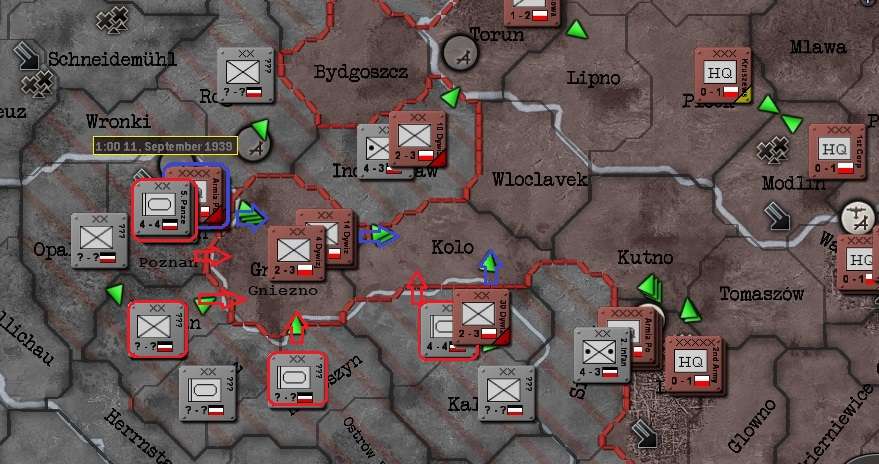
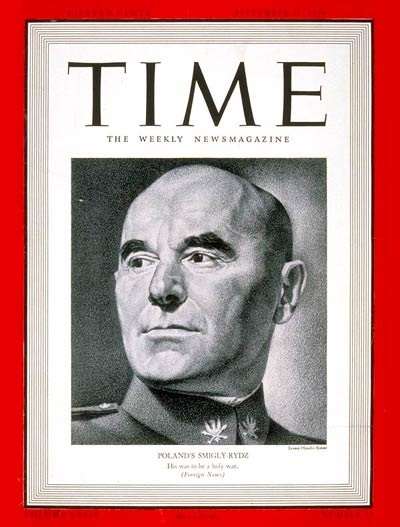
Rydz-Śmigły (aka Śmigły-Rydz) on the cover of Time Magazine, Vol. XXXIV No. 11, September 11, 1939. The caption reads ‘This was to be a holy war’. Poland’s defence continues, but now looks to be in serious danger of collapsing.
On 11 September, from his Theatre Headquarters in Warszawa [in OTL, as CinC he had evacuated to Brest-Litovsk by then] Field Marshal Edward Rydz-Śmigły ordered the Polish capital to be defended at all costs. In his plan, Warszawa and the nearby Modlin fortress were to become two redoubt-citadels in central Poland to fight on for months while the bulk of the Polish forces were to defend the Romanian bridgehead and await the counterattack promised by Poland's French and British allies. Unknown to Rydz-Śmigły (but suspected by Turkey through its spy network in Paris), the Western Allies had no such plans and expected Poland's fall.
Rydz had proven himself an extremely able commander on smaller fronts in earlier wars, but was not an experienced strategist in a great conflict. Indeed, in 1922, in an evaluation of Polish generals, Piłsudski had written about him: “in operational work he displays healthy common sense and a lot of stubborn energy. I could recommend him to everybody as a commander of an army, I am however not sure if he possesses sufficient abilities to function as commander-in-chief in a war between two states.” Poland’s preparations for the lead up to the Second Great War and its early days saw the bubble of his public reputation – even adulation – well and truly burst. There will be no second chance in this ‘Blitzkrieg’, as the Germans are terming it.
By midday on 11 Sep, the remaining two infantry units fleeing entrapment in Poznan (the 14th and the 17th Divs) have made it to Gniezno and are joined in flight by MAJGEN Haller de Hallenburg’s 4th Div, which has totally spent itself holding on for their comrades to pass through. Together with the Polish 30th Div retreating from the south and another straggler from Poznan, they are all in a race for Kolo against the German Panzers.
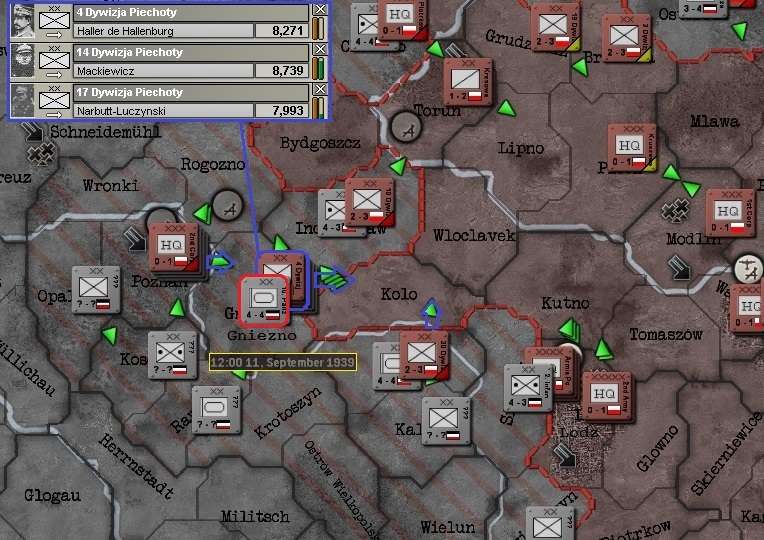
In the vicinity of Lodz, all Polish HQs (four) and one unit (16th Div) are either in forced retreat or are attempting to withdraw in an orderly fashion to the north. Lodz too will be abandoned to the Nazis [Ed: they had occupied it by 9 Sep in OTL].
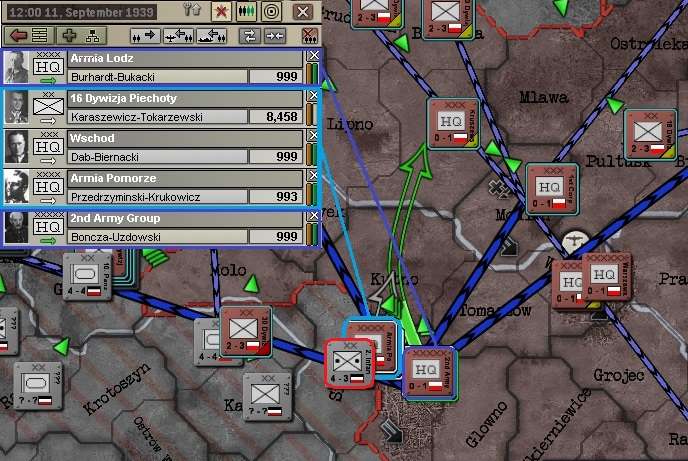
At the same time, reports from our observers in the southern sector report that all resistance has dissolved. Krakow has been abandoned and the Germans will soon occupy it [Ed: in OTL they had already done so by 6 Sep]. There are no forces in place to hold the river-lines, with only ad hoc and isolated positions being formed in depth. The German panzer divisions are now loose in open space.
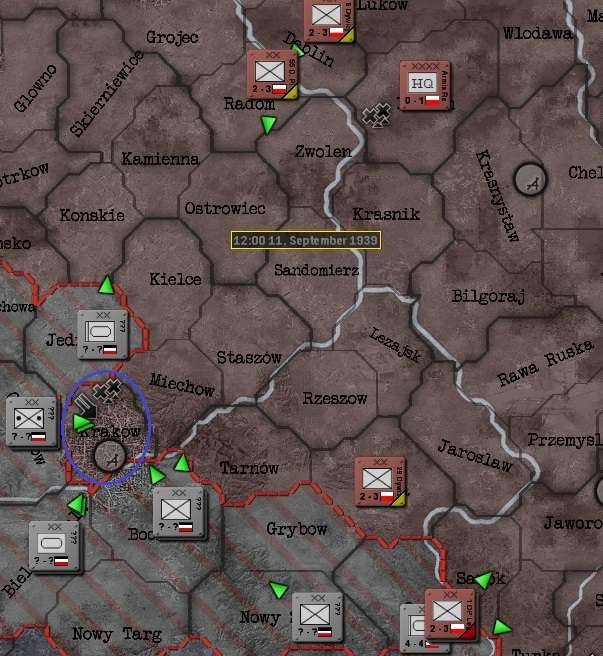
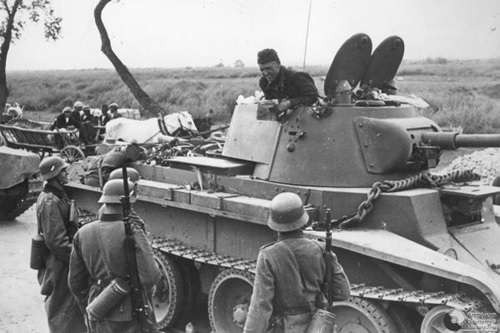
German troops with a PzKpfw 35 (Czech Skodas taken over by the Germans earlier that year and being used in many of their light armoured brigades) on the open plains of southern Poland. It seems there is nothing to stop them for many miles.
Back in Turkey, a fourth battery of Heavy AA is installed in Istanbul. If the Polish experience so far is anything to go by, they will be sorely needed.
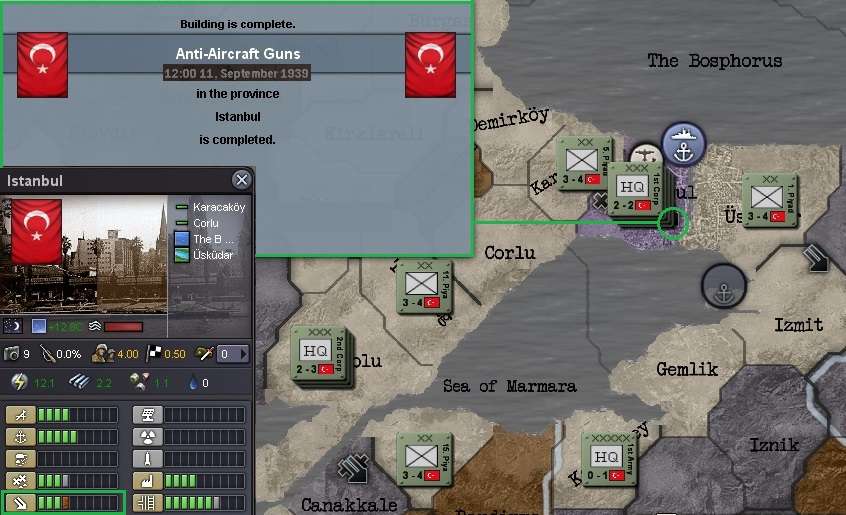
At 6pm that night, Australia joins the Allies – and the Second Great War.

(1:24)
12 Sep 39
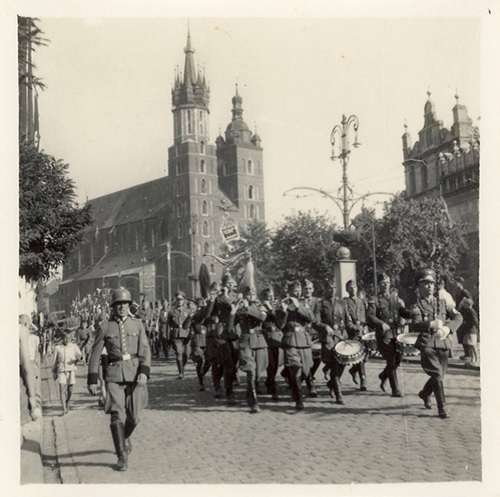
Krakow is occupied in the early hours of 12 Sep [6 Sep in OTL], without a shot being fired. By the morning, a German marching band leads troops through the streets.
Word comes in during the morning that Japan’s Axis puppet Mengkukuo is mobilising.
13 Sep 39
While the fighting continues in Poland, the big news today is that Turkey’s Axis neighbour Italy is also mobilising. This is of far more significance. Of course, it is no guarantee they will involve themselves in the war, but puts them a step closer. France has more to fear from this right now than Turkey. Having to cope with a massed Italian assault on the south of France would seriously tax reserves they would need for the war with Germany. This surely seals the fate of Poland, as France cannot risk an expensive and essentially diversionary attack on Germany when it now has to worry about their vulnerable southern flank.
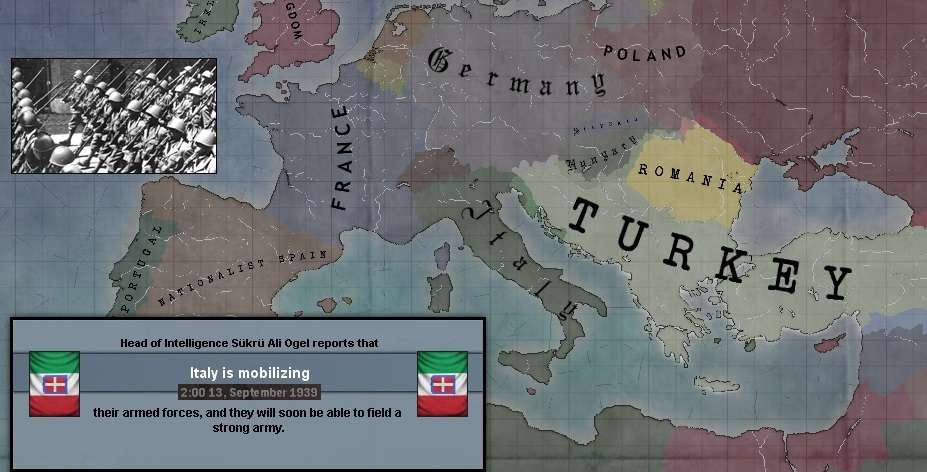
14 Sep 39
Aras provides another diplomatic update over night: this time the news is far better. Since the declaration of war on 1 Sep, our alignment distance has plunged around 40 points and now sits at only 150.27. It was recently sitting at well over 200.
With plans on the drawing board for a recruiting drive, a new infantry brigade is queued for construction. That leave manpower at 33 for now. IC is still at 76, 56.7 of which is available for production. Upgrades and reinforcements account for about 4.0, with the balance of 15.2 going into consumer goods to keep the citizens of the Glorious Union happy. All resources and cash remain in the green.
Early in the morning, before dawn, Inönü receives his weekly situational brief on the war in Poland from one of Ögel’s senior analysts. It doesn’t make for pretty reading.
In the north, the ‘Polish Corridor’ – the ostensible reason for the war – remains open. The corridor has narrowed to just one province wide, but Danzig (though under heavy attack) is still in Polish hands and can trace a line of supply to the capital in Warszawa. The three divisions stationed there remain in firm defensive positions. In the centre, around Torun, German panzers are advancing and the town is now undefended. The desperate units fleeing from the Poznan Pocket are still under arms and trying to make it east to the fortifications of Modlin and the capital. Lodz is open, but the Germans are not yet moving on it.
In Warszawa itself, two wings of fighters (PZL P11s – both low on organisation) and a wing of tactical bombers (Bristol Blenheim Mk1s – the same as used by Turkey – at a bit over 50% organisation) are still in action. A check of the air screen reveals (as expected) there has been heavy German bombing during the last week in battles on the western and northern approaches, with five raids by our bombers in East Prussia and one air battle in Sieradz, to the west of Lodz. There are no details, but it looks as though Polish interceptors may have been trying to hinder German bombing runs there earlier in the week.
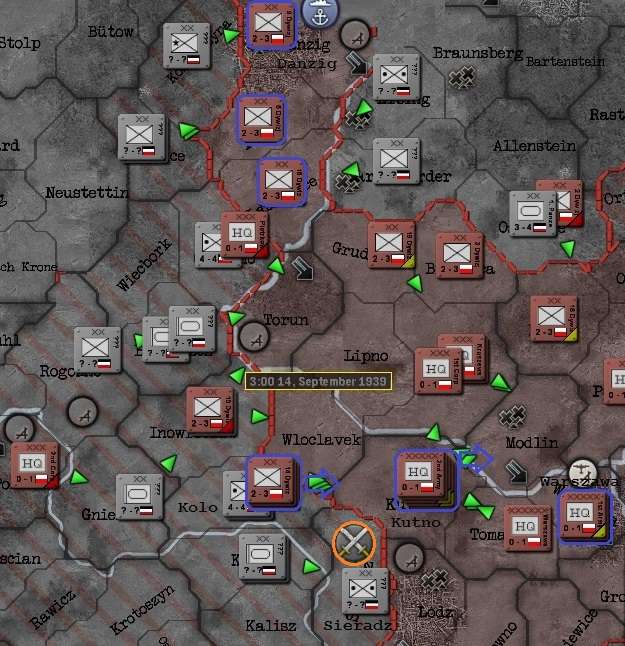
The next map summarises German advances in western Poland since the beginning of the war.
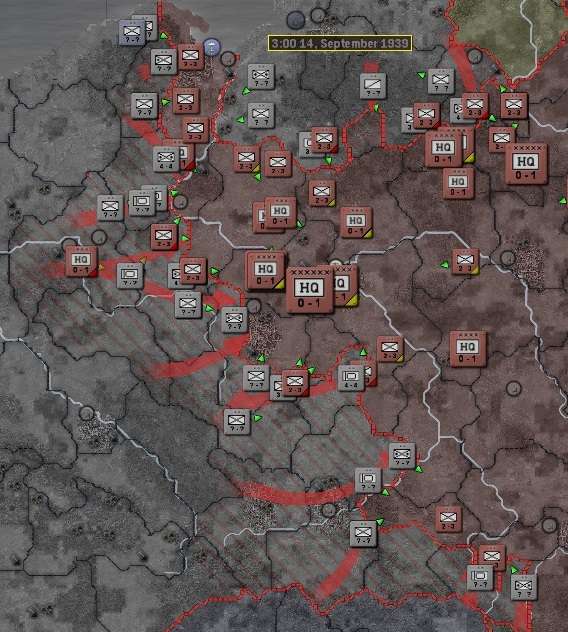
A map of general dispositions shows most of Poland’s eastern forces on their way back to the west, trying desperately to plug the yawning gaps in the line, especially in the south. The task seems hopeless. The Soviets still remain in force on Poland’s border, but have made no move and the Soviet Union has not mobilised.
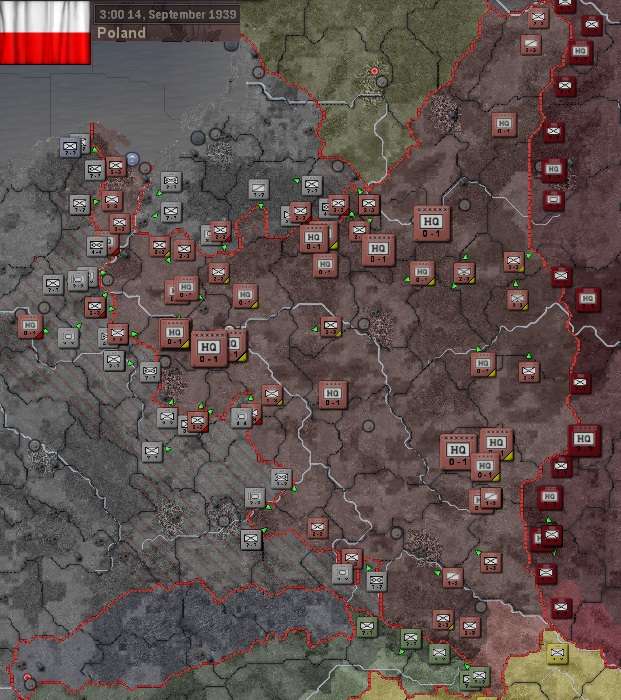
The final graphic illustrates the estimate of Poland’s will to fight. Their national unity is quite similar (a little higher) than Turkey’s: a sobering thought. They are far from willing to give up yet, but the imminent loss of major cities in the west will affect that.
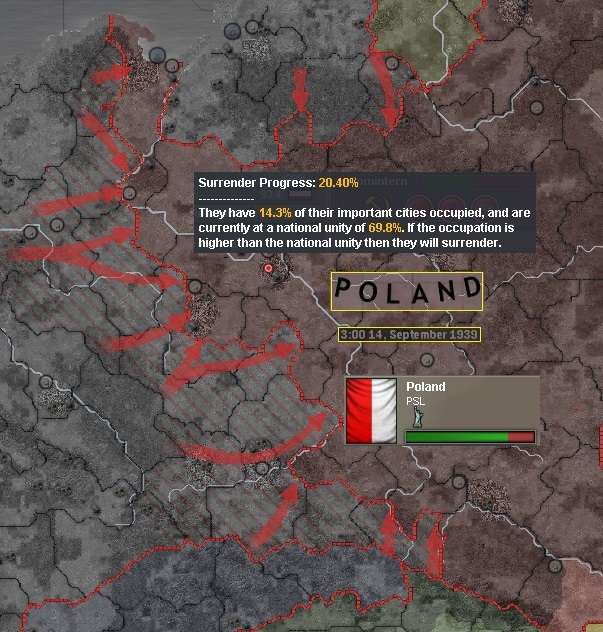
Coming Up: After two weeks of war, Poland is down but not out. Let’s hope they bleed the Germans as much as possible. In France, it’s “all quiet on the Western Front”, except for a few air battles over the Maginot Line at Wissembourg and Cattenom. It looks like Poland will go down fighting, without any material assistance. What use is that kind of ‘security guarantee’? Poland has been diplomatically, strategically and tactically outmanouevred in the most decisive way. In retrospect, they never stood a chance.
The Cabinet is current very glad they didn't hitch their wagon to the Allies: by now we'd also be at war and probably with just as useless a 'security guarantee' as Poland. [Ed: though it is interesting to theorise as to the effect Turkey being in the war now - just with the Germans and their puppet - might have had on the survival of Poland and the course of the rest of the war.]
In Turkey, preparations will get underway soon in earnest to generate the new National Republican Guard structure and start recruiting some provincially sourced units with the hoped-for new manpower. And the Government hopes the stocks of the Comintern continue to rise as spectacularly as they have since the outbreak of the Second Great War.
7 Sep 39
The Propaganda Department liked this poster from the British Daily Mirror. They will store it away for now, rather than producing a Turkish version for inclusion in the Istanbul Times and local Turkish-language papers. Hitler and the Nazis are still greatly disliked (even more so now), but given the sobering effect of what they are doing to Poland and how far away the hoped-for Soviet alliance remains, there is a degree of circumspection in the Turkish public propaganda at the moment.

Cabinet Meeting. However, in Cabinet, the fate of poor Poland is being studied with great interest and not a little fear. While the General Staff cannot of course be sure, they believe Turkey may have enough troops to hold the Calistar Line indefinitely. But they definitely do not believe they have anything near enough to hold southern Greece. Nor the manpower reserves for future unit building plans such as a separate campaign to take advantage of any opportunities that may arise in the Middle East in the shorter term. Or indeed to start laying the foundations for the Great Counter Attack when (not if) the Soviet hordes succeed in defeating the Fascists (whenever that may be – no-one is counting on the Nazi-Soviet Non-aggression pact going its full term). Not to mention distant possibilities of continuing the victorious march of the Comintern across Europe and the world once Fascism has been defeated.
“We must mobilise the now considerable population of the Glorious Union more than we have done to date,” states President Inönü as he opens the meeting. As he is now also Armaments Minister, he is acutely aware of the brake the lack of manpower (and poor tank and aircraft technology) has put on Turkey’s plans. There is only so much infrastructure to be built – what we need is men.
“For now, the only alternative is the good old-fashioned infantry and artillery division for the offensive,” continues the President. “And they’re pretty useful for defence as well. Bayar,” he says, turning to the Prime Minister, “what can we do with legislation? I want to be able to mobilise more men as soon as possible, to build our forces further before war comes to us. But I realise there’s only so much we can do in peacetime. We should have further plans in place to trigger on the outbreak of war, and emergency plans for if we lose significant territory and must call up essential workers and others – who for reasons of age or fitness – may not be recruited to our frontline forces now. We should also take a leaf out of our Great President Atatürk’s book and ensure we can cover some of that increased mobilisation drain by bringing more women into the workforce, including in reserved occupations. It is the Motherland, after all!”
Bayar ponders this, then starts to form some suggestions. “First, as Cabinet has debated previously before I joined it, our current One-Year Draft laws are very inefficient. They actually decrease our manpower generation by 25%. Given our neutrality has long been at zero, we can bypass the Two-Year Draft and go straight to Three Years (which gives a 25% bonus) once our National Unity reaches 70%. Kaya advise it is currently very nearly at 68% and seems to be growing at around 0.1% per month. At that rate, 70% unity is still a way off - we’re more likely to be at war by then and able to impose Service by Requirement anyway (100% bonus). So, unless there is some way to dramatically boost National Unity now, we need more than Conscription Law reform. And also, that kind of accumulation is incremental – we need something larger and more immediate, as a ‘one-off’."
“Yes,” muses Inönü. He addresses the Chief of Staff next. “Örlungat, we all saw what the Germans did with that ‘Blitzkrieg Declaration’ of theirs a few days ago. They motivate the masses and got an immediate ‘sugar hit’ of 200 manpower! We need something like that.”
Örlungat confers with Fuad Calistar, who remains the Supreme (Theatre) Commander and still sits in Cabinet as Information Minister (including his beloved Propaganda Department). “Perhaps, in the short term, we can mount a patriotic campaign to mobilise some new recruits from our vast new Dominions. New units raised under that program can be given patriotic names derived from their Glorious National Republic roots. We could call new units raised under these provisions the ‘National Republican Guard’ and give them localised titles. The Balkans in particular can now see the Fascist threat up close: they may not all love us yet, but the Glorious Union is now looking better than the prospect of living under Nazi tyranny and they have seen the fresh examples of Czechoslovakia and Poland. It would only be a relatively modest recruiting drive given we’re not at war yet, but that should be say 10-12 Brigades worth (say around 40 MP).”
“Yes, good, I like it!” enthuses Inönü. “For many of our poorer Dominion citizens, the pay they will get in the Armed Forces will be significantly better that what they’re getting now and we can support that. What else can we do.”
“We can have a couple of emergency measures in place,” says Celal Bayar, who has been thinking while the others have been talking up their plan. “Once war comes, our manpower accumulation will of course start to grow quickly, but it is off a low base and we may soon find ourselves needing many reinforcements just to keep our units fighting and recovering from battle. That defence correspondent from the Istanbul Times, Nukeluru Slorepee, has had some good ideas recently. I think it would be very reasonable to declare a ‘Defend the Motherland’ edict if we go to war with a major power, which would allow us to call up non-mobilised reserve forces from across the UGNR. Slorepee seemed to think that might yield up to around 100 more MP.”
“Excellent, excellent! Let’s draw up plans for that and start identifying the members of this ‘Motherland Defence' program.” This is good, but Inönü still wants to consider the worst case. “This is not defeatism, but we have all lived through the dark days of the fall of the Ottoman Empire and the desperate fight against the Greeks that followed, when they almost seized Ankara. We will keep the following highly confidential, but we need to make more plans in case disaster befalls us. By then, the situation will be desperate enough to justify radical measures and the people will be motivated to resist imminent destruction and enslavement by godless Nazi oppressors. Let us draw up plans in case the defences of either Istanbul or Ankara fall and we must defend to Glory or Death." Perhaps both!
“Slorepee has done some private research on this eventuality, but our censors – very wisely – prevented him from publishing such alarmist analysis. It’s not like we have a free press that can publish anything it likes, no matter the danger to the Nation!” Bayar notes. Murmurs of ‘hear, hear’, ‘indeed not’ and ‘a good thing too’ echo around the table. “He thought that might generate another available 500 MP – which should keep our industry cranking out land forces for as long as we can sustain them. Though presumably losing the industrial base of the Balkans and Istanbul would put a large dent in our industrial potential. We can tap the manpower pool as necessary – they are not all going to be removed from the workforce at once, and we will ‘encourage’ military aged men from any overrun Balkan provinces to keep falling back to the Turkish heartland, where they can be used to augment this pool. We will simultaneously keep our industry and agriculture going, as we bring more women into the mainstream workforce.”
“Yes, good thinking. Perhaps we should start looking at building some more IC capacity in safe areas to replace what we may lose and be able to take advantage of any wartime manpower boosts? By then we may also be producing armour and air units once we can get decent licenses again from our Soviet brethren. We’ll have to give this Slorepee the traditional signed Atatürk photo and cash bonus. More than the 50 lira we normally give out.” Inönü is now in a better mood: Turkey never wants to be in a position where its major industrial centre, ancient capital and European toehold or current capital have been conquered, but if that were to happen, at least such measures can give hope for redemption and revenge. “If the dark day ever comes where we must enforce this program, we will rally the Motherland and the Glorious Union with the cry of “For Atatürk and Glorious Victory!”
Plans will now be set in place and the first public information campaign drawn up. Busy times beckon for Braanszon and Persephonee. Turkey will not be caught with its guard down!
8 Sep 39
In a major turning point for the war … Luxemburg mobilises! The report says the usual “soon they will have a strong army”, but that will be taken with a very large grain of salt in this case.
9 Sep 39
Led by the commander of the Polish 19th Div MAJGEN Oziewicz, and supported by 15th Div, Polish forces in the north continue to attack the Germans in East Prussia. Alas, in this battle, although hard pressed, the German 2nd Inf Div in Marienwerder is entrenched, fortified, has a river covering one flank and the better general. Not a recipe for easy Polish success, unfortunately, but maybe with superior numbers they will prevail – though for what would only be a costly and symbolic victory. Noteworthy are the German bomber wings which are very active in Polish skies.


A German Heinkel He 111 bombing the Polish 19th Div in Grudziadz, 9 Sep 39.

The Polish fighters have tried to contest the skies, but have been outnumbered and outperformed by their German adversaries. This is the Polish-built mainstay fighter, the PZL P11. Alas, many of them were caught like this in the first few days – on the ground. But they continue to survive and fight back where they can.
While the gallant but futile Battle for Marienwerder continues to the north, at 0900 Poznan falls to the Germans. While the significant forces there (a Corps HQ and three infantry divisions) fall back east to Gniezno, that province itself is also already under attack from the west and south, where the Polish 4th Div is trying to hold ground to enable their compatriots to escape. In Krepice to the south, 28th Div is also trying to retreat from an isolated position.

10 Sep 39
The enemy is still some distance from Warszawa, but bombing raids have begun. [Ed: the Germans here are a bit slower than in OTL – the siege of Warsaw had begun by 8 Sep.]

Polish Heavy AA guns near Warszawa prepare for another German air raid – their main defence with the Polish Air Force being so hard-pressed.
11 Sep 39
By the early morning of 11 Sep, Polish units are beginning to emerge from Poznan to Gneizno, but the Polish 4th Div is under heavy pressure, including from medium tanks (PzKpfw IIIs) attacking from the south. With no specialist AT units, this is going to be a hard fight against time, especially now that the next province to the east – Kolo – is also under attack from German medium armour, and has no set defence.


Rydz-Śmigły (aka Śmigły-Rydz) on the cover of Time Magazine, Vol. XXXIV No. 11, September 11, 1939. The caption reads ‘This was to be a holy war’. Poland’s defence continues, but now looks to be in serious danger of collapsing.
On 11 September, from his Theatre Headquarters in Warszawa [in OTL, as CinC he had evacuated to Brest-Litovsk by then] Field Marshal Edward Rydz-Śmigły ordered the Polish capital to be defended at all costs. In his plan, Warszawa and the nearby Modlin fortress were to become two redoubt-citadels in central Poland to fight on for months while the bulk of the Polish forces were to defend the Romanian bridgehead and await the counterattack promised by Poland's French and British allies. Unknown to Rydz-Śmigły (but suspected by Turkey through its spy network in Paris), the Western Allies had no such plans and expected Poland's fall.
Rydz had proven himself an extremely able commander on smaller fronts in earlier wars, but was not an experienced strategist in a great conflict. Indeed, in 1922, in an evaluation of Polish generals, Piłsudski had written about him: “in operational work he displays healthy common sense and a lot of stubborn energy. I could recommend him to everybody as a commander of an army, I am however not sure if he possesses sufficient abilities to function as commander-in-chief in a war between two states.” Poland’s preparations for the lead up to the Second Great War and its early days saw the bubble of his public reputation – even adulation – well and truly burst. There will be no second chance in this ‘Blitzkrieg’, as the Germans are terming it.
By midday on 11 Sep, the remaining two infantry units fleeing entrapment in Poznan (the 14th and the 17th Divs) have made it to Gniezno and are joined in flight by MAJGEN Haller de Hallenburg’s 4th Div, which has totally spent itself holding on for their comrades to pass through. Together with the Polish 30th Div retreating from the south and another straggler from Poznan, they are all in a race for Kolo against the German Panzers.

In the vicinity of Lodz, all Polish HQs (four) and one unit (16th Div) are either in forced retreat or are attempting to withdraw in an orderly fashion to the north. Lodz too will be abandoned to the Nazis [Ed: they had occupied it by 9 Sep in OTL].

At the same time, reports from our observers in the southern sector report that all resistance has dissolved. Krakow has been abandoned and the Germans will soon occupy it [Ed: in OTL they had already done so by 6 Sep]. There are no forces in place to hold the river-lines, with only ad hoc and isolated positions being formed in depth. The German panzer divisions are now loose in open space.


German troops with a PzKpfw 35 (Czech Skodas taken over by the Germans earlier that year and being used in many of their light armoured brigades) on the open plains of southern Poland. It seems there is nothing to stop them for many miles.
Back in Turkey, a fourth battery of Heavy AA is installed in Istanbul. If the Polish experience so far is anything to go by, they will be sorely needed.

At 6pm that night, Australia joins the Allies – and the Second Great War.

12 Sep 39

Krakow is occupied in the early hours of 12 Sep [6 Sep in OTL], without a shot being fired. By the morning, a German marching band leads troops through the streets.
Word comes in during the morning that Japan’s Axis puppet Mengkukuo is mobilising.
13 Sep 39
While the fighting continues in Poland, the big news today is that Turkey’s Axis neighbour Italy is also mobilising. This is of far more significance. Of course, it is no guarantee they will involve themselves in the war, but puts them a step closer. France has more to fear from this right now than Turkey. Having to cope with a massed Italian assault on the south of France would seriously tax reserves they would need for the war with Germany. This surely seals the fate of Poland, as France cannot risk an expensive and essentially diversionary attack on Germany when it now has to worry about their vulnerable southern flank.

14 Sep 39
Aras provides another diplomatic update over night: this time the news is far better. Since the declaration of war on 1 Sep, our alignment distance has plunged around 40 points and now sits at only 150.27. It was recently sitting at well over 200.
With plans on the drawing board for a recruiting drive, a new infantry brigade is queued for construction. That leave manpower at 33 for now. IC is still at 76, 56.7 of which is available for production. Upgrades and reinforcements account for about 4.0, with the balance of 15.2 going into consumer goods to keep the citizens of the Glorious Union happy. All resources and cash remain in the green.
Early in the morning, before dawn, Inönü receives his weekly situational brief on the war in Poland from one of Ögel’s senior analysts. It doesn’t make for pretty reading.
In the north, the ‘Polish Corridor’ – the ostensible reason for the war – remains open. The corridor has narrowed to just one province wide, but Danzig (though under heavy attack) is still in Polish hands and can trace a line of supply to the capital in Warszawa. The three divisions stationed there remain in firm defensive positions. In the centre, around Torun, German panzers are advancing and the town is now undefended. The desperate units fleeing from the Poznan Pocket are still under arms and trying to make it east to the fortifications of Modlin and the capital. Lodz is open, but the Germans are not yet moving on it.
In Warszawa itself, two wings of fighters (PZL P11s – both low on organisation) and a wing of tactical bombers (Bristol Blenheim Mk1s – the same as used by Turkey – at a bit over 50% organisation) are still in action. A check of the air screen reveals (as expected) there has been heavy German bombing during the last week in battles on the western and northern approaches, with five raids by our bombers in East Prussia and one air battle in Sieradz, to the west of Lodz. There are no details, but it looks as though Polish interceptors may have been trying to hinder German bombing runs there earlier in the week.

The next map summarises German advances in western Poland since the beginning of the war.

A map of general dispositions shows most of Poland’s eastern forces on their way back to the west, trying desperately to plug the yawning gaps in the line, especially in the south. The task seems hopeless. The Soviets still remain in force on Poland’s border, but have made no move and the Soviet Union has not mobilised.

The final graphic illustrates the estimate of Poland’s will to fight. Their national unity is quite similar (a little higher) than Turkey’s: a sobering thought. They are far from willing to give up yet, but the imminent loss of major cities in the west will affect that.

Coming Up: After two weeks of war, Poland is down but not out. Let’s hope they bleed the Germans as much as possible. In France, it’s “all quiet on the Western Front”, except for a few air battles over the Maginot Line at Wissembourg and Cattenom. It looks like Poland will go down fighting, without any material assistance. What use is that kind of ‘security guarantee’? Poland has been diplomatically, strategically and tactically outmanouevred in the most decisive way. In retrospect, they never stood a chance.
The Cabinet is current very glad they didn't hitch their wagon to the Allies: by now we'd also be at war and probably with just as useless a 'security guarantee' as Poland. [Ed: though it is interesting to theorise as to the effect Turkey being in the war now - just with the Germans and their puppet - might have had on the survival of Poland and the course of the rest of the war.]
In Turkey, preparations will get underway soon in earnest to generate the new National Republican Guard structure and start recruiting some provincially sourced units with the hoped-for new manpower. And the Government hopes the stocks of the Comintern continue to rise as spectacularly as they have since the outbreak of the Second Great War.
Last edited:
- 1
nuclearslurpee, (aka defence correspondent Nukeluru Slorepee in the TT universe), the thanks of a grateful Turkey and Union of Glorious National Republics be on you! By way of expressing the gratitude of the Government for your recent advice on mobilisation theories, the following is offered as a token of the President's esteem:
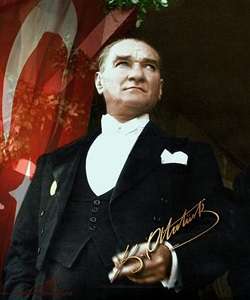
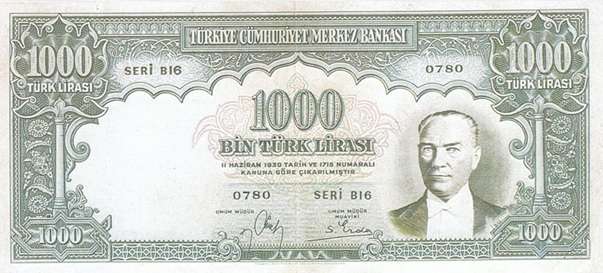
Acknowledgements also to those who have made similar suggestions in the past. I'm not too proud to change my views for the reader, story and of course the Great and Glorious Republic of Turkey! 


- 1
Plans will now be set in place and the first public information campaign drawn up. Busy times beckon for Braanszon and Persephonee.
Just as an aside, let me say that your creative excuses to draw characters into crazy plots never fail to entertain.
We’ll have to give this Slorepee the traditional signed Atatürk photo and cash bonus. More than the 50 lira we normally give out.”
I also accept payment in the form of pizza and beer, although I suspect that the latter may be tricky to come by in this part of the world...
In a major turning point for the war … Luxemburg mobilises! The report says the usual “soon they will have a strong army”, but that will be taken with a very large grain of salt in this case.
This happens in every game and never fails to make me chuckle.
nuclearslurpee, (aka defence correspondent Nukeluru Slorepee in the TT universe), the thanks of a grateful Turkey and Union of Glorious National Republics be on you! By way of expressing the gratitude of the Government for your recent advice on mobilisation theories, the following is offered as a token of the President's esteem:
*sniff* I'd like to thank the Glorious National Academy... *dabs eyes with handkerchief*
- 1
Turkey may have enough troops to hold the Calistar Line indefinitely.
Hmm...even that is a bit doubtful considering who turkey is up against.
Örlungat confers with Fuad Calistar, who remains the Supreme (Theatre) Commander and still sits in Cabinet as Information Minister (including his beloved Propaganda Department).
Oh yeah, forgot he was still technically in charge. This might be a first, a military leader still being alive when his grand defensive or offensive plan is tested in an actual war! Hopefully it is many more times successful than every other grand plan of the past fifty years.
That defence correspondent from the Istanbul Times, Nukeluru Slorepee, has had some good ideas recently. I think it would be very reasonable to declare a ‘Defend the Motherland’ edict if we go to war with a major power, which would allow us to call up non-mobilised reserve forces from across the UGNR. Slorepee seemed to think that might yield up to around 100 more MP.”
This is very probably what would happen, mass recruitment through propaganda.
In a major turning point for the war … Luxemburg mobilises! The report says the usual “soon they will have a strong army”, but that will be taken with a very large grain of salt in this case.
Taking all bets on how many days they will last. Do I see an offer for a week?
While the fighting continues in Poland, the big news today is that Turkey’s Axis neighbour Italy is also mobilising.
Oh dear...
France has more to fear from this right now than Turkey.
Yes, probably. They really cant fight both at the same time without the British going all in. And they never will.
The Cabinet is current very glad they didn't hitch their wagon to the Allies: by now we'd also be at war and probably with just as useless a 'security guarantee' as Poland. [Ed: though it is interesting to theorise as to the effect Turkey being in the war now - just with the Germans and their puppet - might have had on the survival of Poland and the course of the rest of the war.]
It seems that way but now that I think about it the order still would have been Poland, France, then Turkey. Germany would always start with Poland because its isolated, it buys off the Russians for a while and gets the ball rolling with an easy-ish victory.
Then there's a choice, France or Turkey? Now Germany and Italy can attack either but the French border is far more open to assault as well as the Low Countries being a big chink in their armour. Paris being so close as well means that Germany can smash through whatever defences are in place and secure the capital whilst Italy causes a distraction/flanking manoeuvre in the south.
Turkey would be harder to invade because it means either fighting through small borders before fighting across the entire Balkans to get to anywhere valuable (Greece and turkey itself) or launching a big naval invasion (which requires France being out of the war and the UK on the defensive if Germany wants to help Italy with that). Plus attacking turkey really only helps with one thing: more fronts with Russia. And Russia knows that. So unless the Germans literally only want to take the Balkans back (which they could do but it would be a waste of resources considering Africa and the Middle East are up for grabs), the Russians and the Turks are going to fight together to ensure the Axis don't gain any ground. And I doubt the Nazis, insane as they were, would commit to war with the entirety of the Soviet Union and Turkey at the same time (especially with the UK and France still at large in GB and in Africa). So the difference would be, I think, less action on the eastern front and more 'cold war' type stuff for years, whilst the UK and Africa get a heck of a lot more attention because until they fall the Axis cannot dream of winning big in the east.
So its essentially like in OTL but even worse for the Axis. Interesting, isn't it?
- 1
It is at that. One day (years from now probablySo its essentially like in OTL but even worse for the Axis. Interesting, isn't it?
- 1
Chapter 65: “Lepiej umrzeć stojąc”: Better to Die Standing (14 to 20 September 1939)
Chapter 65: “Lepiej umrzeć stojąc”: Better to Die Standing (14 to 20 September 1939)
[Ed: Hope the translation is OK - got it from a wiki list of Polish proverbs. Apologies if it’s not: I may be half-Polish but have never spoken it!
I am on a bit of a run at the moment over the weekend, and the battle report format is shorter and quicker to write, so here we go again (especially as its commentary, not an explanation of one's own strategy or tactics). As a note, in real life reporting there was plenty of more detailed reporting and many more battles noted. A week per update may seem fairly slow going, but only the highlights are being reported. Alas, I am sure it will all be over soon enough. Then, if the terms of the Nazi-Soviet Pact are enforced, our propagandists will have to perform some particularly deft (or well spun) verbal contortions as they try to reconcile our hatred for German Fascist aggression and solidarity for Poland with the actions of our prospective ally. Calistar, Braanszon and Persephonee have never been quite so in-demand!]
14 Sep 39
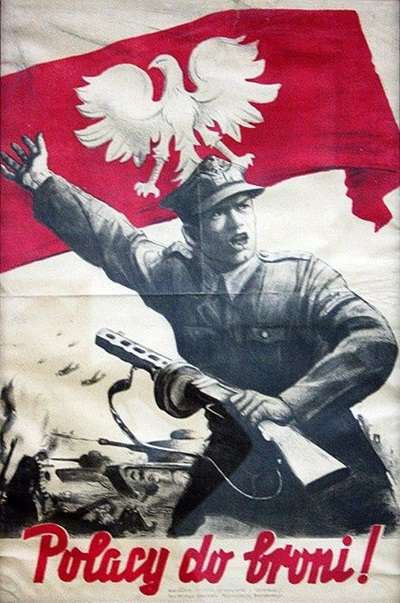
“Poles to Arms”. They try to rally, but it looks grim.
(1:10)
The only war we can see happening in the West is in the air (we're not receiving naval reports). Here, the first British gun camera footage is shown. Along with some pretty crude propaganda commentary. Persephonee shakes her head while watching it; she reckons she could have done a lot better herself.
In the morning, word comes through that another Japanese puppet government, that of Manchukuo, has ordered its forces to mobilise. In the evening, New Zealand announces it is also joining the Allies and therefore the Second Great War. [Ed: Any Kiwi readers will note I have made no disrespectful reference to sheep here - it is too solemn an occasion!]
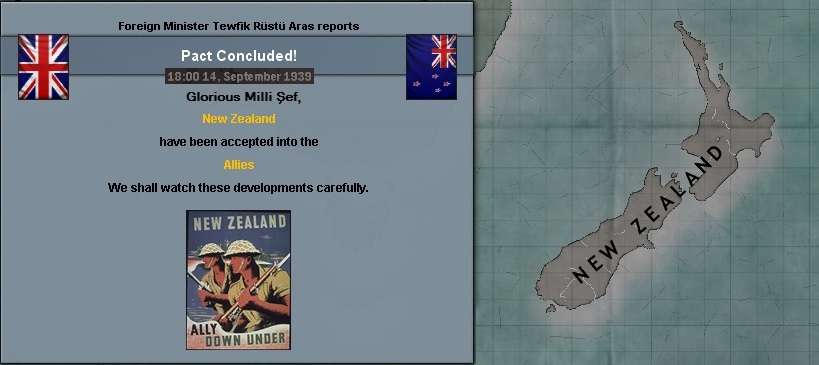
15 Sep 39
News Report: US Radio Broadcast. Charles Lindbergh makes a nationwide radio broadcast in favour of American isolationism. “It is madness to send our soldiers to be killed as we did in the last war if we turn the course of peace over to the greed, the fear and the intrigue of European nations. We must either keep out of European wars entirely or stay in European affairs permanently”, Lindbergh says. “We must not permit our sentiment, our pity, or our personal feelings of sympathy, to obscure the issue, to affect our children's lives ... America has little to gain by taking part in another European war.”
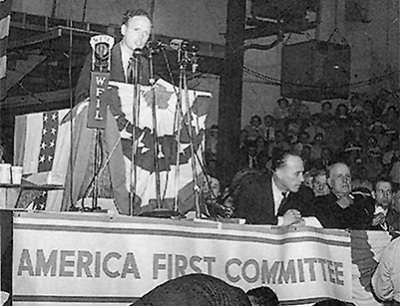
Charles Augustus Lindbergh (b. February 4, 1902) was an American aviator, military officer, author, inventor, explorer, and environmental activist. At age 25 in 1927, he went from obscurity as a U.S. Air Mail pilot to instantaneous world fame by making his Orteig Prize–winning nonstop flight from Long Island, New York, to Paris in the “Spirit of St. Louis”. This was the first solo transatlantic flight, and the first non-stop flight between North America and mainland Europe. An advocate of non-interventionism, he supported the anti-war America First Committee, which opposed American aid to Britain in its war against Germany.
16 Sep 39
Reports from the northern and central sectors of the western front, received at 0800, indicate Polish forces are coming under increasing pressure, but some are still resisting strongly. In the north, Danzig and ‘The Corridor’ are now essentially lost. The 9th Div (in Danzig) is in retreat, as is the 5th Div in Tczew – to where the 9th is attempting to retreat. MAJGEN Kruszewski’s 15th Div is still resisting against superior numbers in Laskowice (the next province south) but looks close to breaking. One or both retreating Polish divisions are likely to be cut off and forced to surrender. In Torun, the Polish 10th Div is holding well in the forests: this is a strong position covered by river-lines on all but its eastern approaches. But it is currently under attack by two panzer divisions (the 4th and 5th) led by Model. While the odds seem fair for now, the drain on the Poles' organisation is already evident. But they are holding.
The bad (worse) news for these Polish units is the seizure of Plock by a strong German motorised infantry division. Up to five Polish divisions are in danger of being cut off and pocketed in what is now a northern salient. The key fortified province of Modlin is not yet garrisoned by a front-line unit – its loss would seriously undermine any Polish plans for a long campaign of resistance. A strong German fighter force can be seen conducting air operations over the capital (4 VP). In better news, the fresh Polish 44th Div has now arrived - apparently by rail - at the key (2 VP) city of Lodz, which had seemingly been abandoned a few days earlier; just in time.
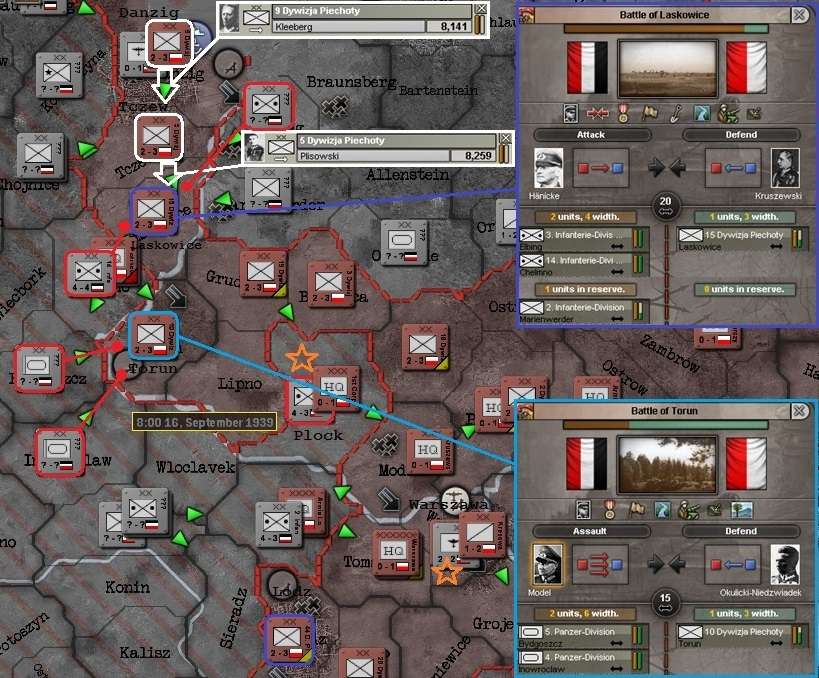
Meanwhile, Theatre Commander FM Rydz-Śmigły has been forced into ignominious retreat towards Warszawa. Our liaison officer there passes on Rydz’s current estimate of his own and the enemy’s relative power: it is not good. His ultimate objective of ‘Berlin’ might now be a trifle optimistic: his front is crumbling around him.
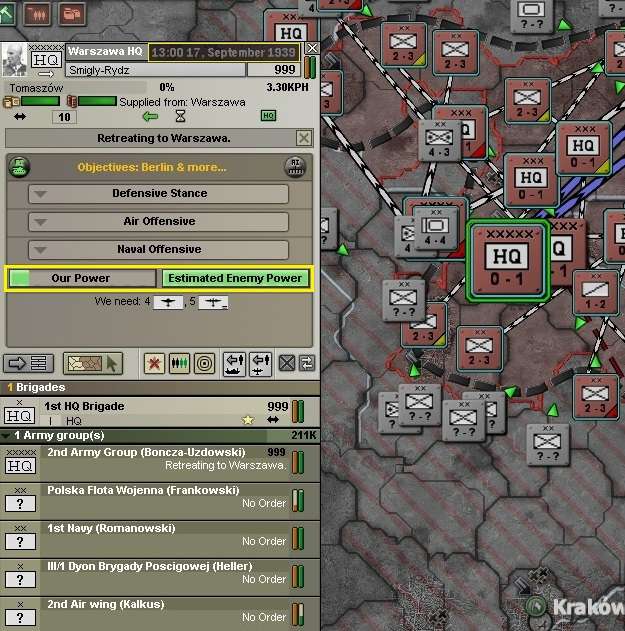
17 Sep 39
By 1300, the situation has deteriorated markedly. The Battle for Torun continues, but Model’s relentless panzer assault is taking its toll. It appears MAJGEN Kleeberg’s 9th Div was unable to escape from Danzig and has been forced to surrender in Tczew; which, along with Laskowice, has now been occupied by the Germans. 5th Div is still trying to make it out but, even if it does, the pocket could be closing further to the east. The Germans are closing in on the now undefended Danzig from three directions: it will soon be in their hands (and with it 2 VP).
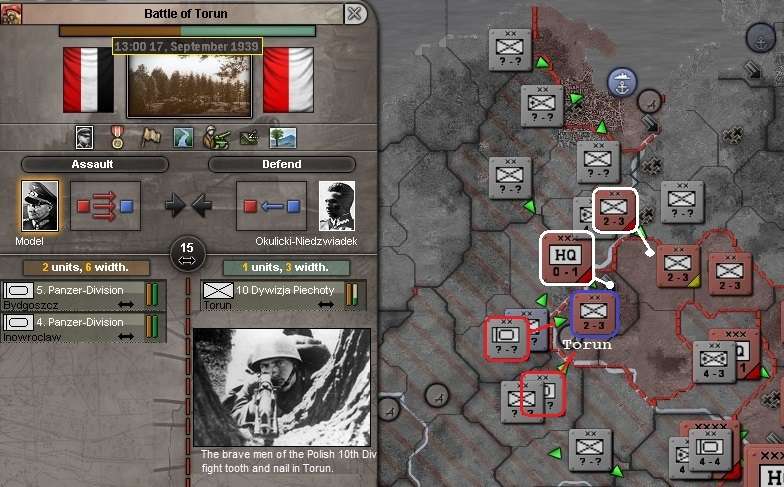
18 Sep 39
News Report: Danzig, German-occupied Poland. Danzig falls to the Germans at 7am. The Battle of Westerplatte was the first battle in the Invasion of Poland and marked the start of the Second Great War in Europe. Beginning on September 1, 1939, German naval forces and soldiers and Danzig police assaulted the Polish Military Transit Depot (Wojskowa Składnica Tranzytowa, or WST) on the peninsula of Westerplatte, in the harbour of the Free City of Danzig. The Poles held out for seventeen days [seven days in OTL] in the face of a heavy attack that included dive bombers.
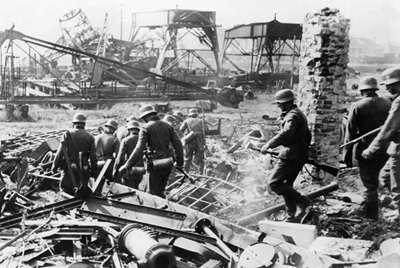
German troops seen here at Westerplatte in Danzig, the scene of heavy fighting from the first day of the war.
Our Defence Attaché in Warszawa reports that at midday, German panzer divisions have been spotted immediately to the south-west and south-east of the capital, but there is no front-line garrison as yet. This is very poor preparation and indicates the Polish leadership is in disarray: as a minimum, one infantry division (preferably three) should already have been in place and well-entrenched by now. Only GEN Szylling’s Armia Warszawa HQ is currently defending the capital (at least it hasn’t fled yet), with Bittner’s 1st Army Gp HQ heading for the east. The German armoured pincer has cut off Lodz and the two provinces to its east in a pocket. The battered 28th Div (which has been fighting since the first day of the war, starting in the border north of Katowice) and a cavalry division are attempting to break out to the north, but they stand zero chance against German medium armour. Their only hope will be to try to make it back west to Lodz for a final showdown.
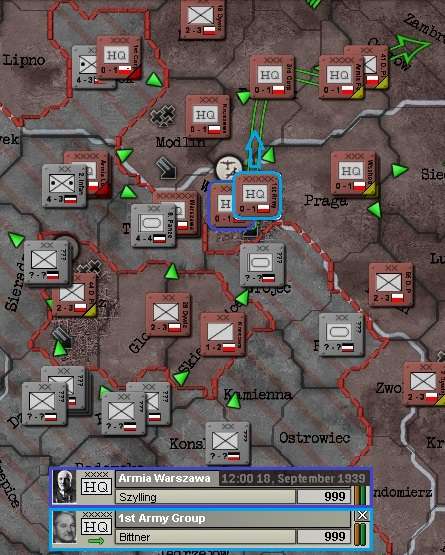
A couple of HQs and one already leaving: hardly a sufficient garrison for the capital with the wolf at the door!
News Report: Berlin, Germany. That evening, William Joyce begins making English-language propaganda broadcasts over German radio to England. He would earn the nickname Lord Haw-Haw.
Joyce was of Anglo-Irish descent, but was born in Brooklyn. He returned to Ireland when he was a boy, his family later relocating to England after the Republicans took over in the south (they had backed the Protestants). On 22 October 1924, while stewarding a meeting in support of Jack Lazarus (the Conservative Party candidate for Lambeth North in the general election), Joyce was attacked by Communists and received a deep razor slash that ran across his right cheek. It left a permanent scar which ran from the earlobe to the corner of the mouth. He later turned to Fascism.
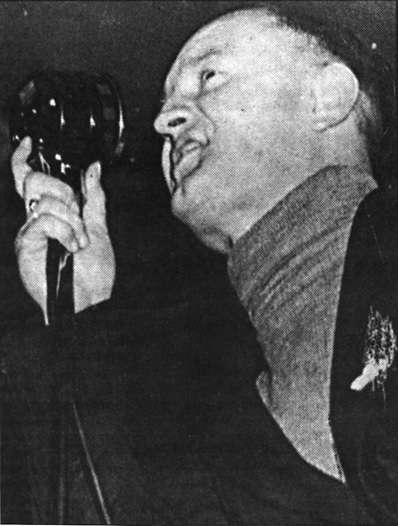
William Brooke Joyce (b. 24 April 1906), nicknamed Lord Haw-Haw, is an American-born, Fascist politician and now Nazi propaganda broadcaster to the United Kingdom.
At 2300, a report is received that Torun has fallen to the Germans. Our Attaché is not sure what has become of the gallant defenders, but the pocket has not yet been closed off, so some more troops may emerge from it in the next day or two.
19 Sep 39
News Report: Danzig, German-occupied Poland. Hitler enters the recently occupied former Free City of Danzig and gives a speech denouncing the Polish government and warning England that Germany would never capitulate even if the war lasted years.
20 Sep 39
The early morning brings news from the ‘Torun-Grudziadz Pocket’, which still remains open but is now threatened with closure by a German attack from Marienwerder on Brodnica. Further west, a corps HQ and three Polish infantry divisions are still trying to escape. MAJGEN Orlick-Lukoski’s 3rd Div is holding strong, but the accompanying 19th Div is almost out of organisation and will surely break at any moment. The fate of their comrades now rests squarely on the shoulders of 3rd Div against the German’s attempted Breakthrough attack.
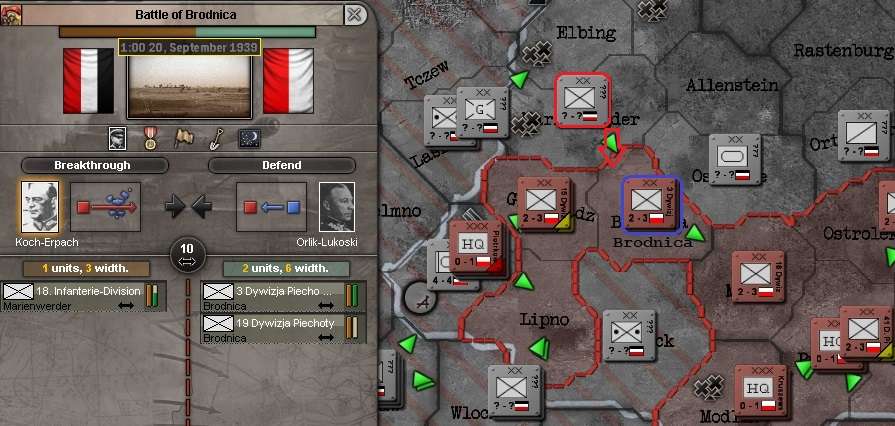
In Lodz, MAJGEN Wolkowicki’s 44th Div fights on against heavy odds, making use of the favourable urban terrain, fortifications and entrenchments. At present, German infantry (led by MAJGEN Curtze, with three divisions) is doing the main fighting: they are trying a Shock assault to force a quick result. If that doesn’t work, they have the 8th Pz Div is reserve. To the east, the beleaguered 28th Div is trying to make it to Lodz, for a desperate last stand. The cavalry division seen further to the east looks like it will be cut off and forced to surrender.
In slightly better news, our Attaché reports the Polish 22nd Div has just arrived by rail in Warszawa. They will need to entrench quickly if they are to hold out for any length of time and need more reinforcements to do so, at that. To make things more dangerous, the key fortress of Modlin to the north-west is still undefended.
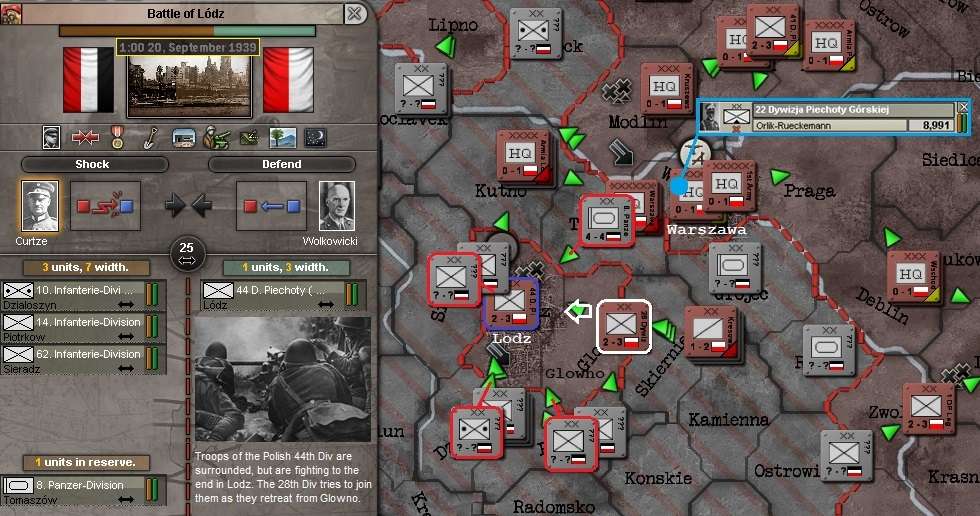
On the southern front, things are now faring a little better, with reinforcements from the east having arrived. Poland appears to have consolidated a line of defence in front of the key southern city of Lwow. The Germans have picked on what they must assess as the weak point in this hastily constituted line, with the 9th Pz Div launching a Shock attack on MAJGEN Grzmot-Skotnicki’s ‘Mazowiecka’ Cav Div in Turka. German panzers against Polish Cavalry! But in this case, rather than launching reckless charges, the cavalry is using its mobility and the cover of the forest terrain to put up a solid defence. And while the sabre may not work well against panzers, it seems to do fine against German motor-cycle troops when they are ambushed in the forest!
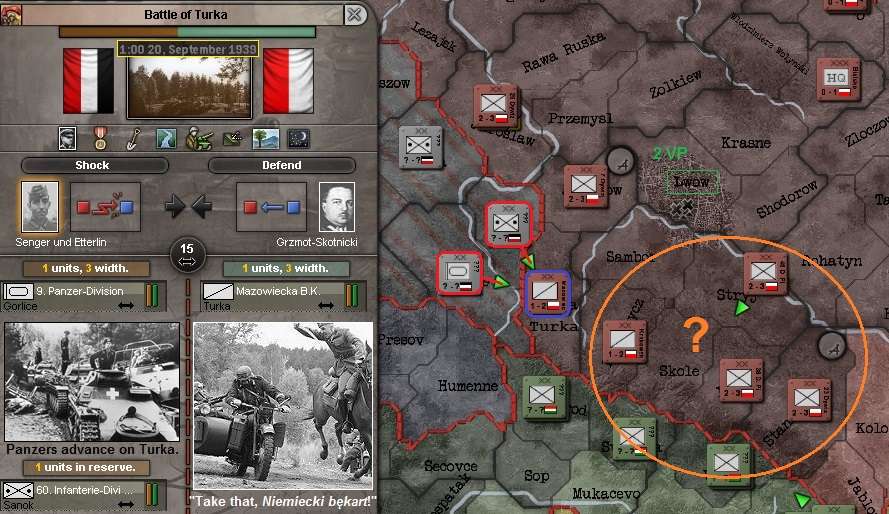
And to put the Polish lances (as opposed to cavalry) vs German panzers ‘fake news’ to bed, see this excerpt [Ed: article has not been cross-checked or verified by me, but it is in line with my understanding of the real situation and certainly seems to be the way the game plays it]:
Although Hungary is in the Axis, they have not yet entered the war. But that has not stopped the Poles from assembling a solid fortified line along that border (though the river-line extending south-west from Lwow might have been a more defendable depth position). Do the Poles know something we don’t? Perhaps they have learned the lesson of not having properly garrisoned the Slovakian border at the start of the war.
Back home in Turkey, a very welcome technical advance has been made: the third of the level 3 (1938 model) infantry equipment techs has been researched. Only Light Artillery (due in December) is required now for all four to be completed. Now that we have put such a heavy investment into fixed AA installations, it’s time to take its efficiency to the next level.
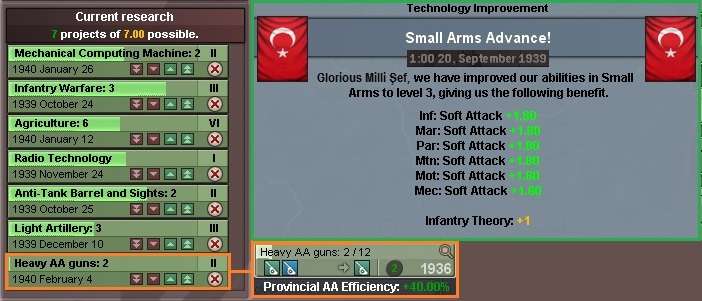
Next, Foreign Minister Aras takes great pleasure in declining another trade request from the filthy Hun aggressor: they want good Turkish fuel to power their evil war machine as it drives across Poland. The cheek of it! The answer is a firm “asla”!
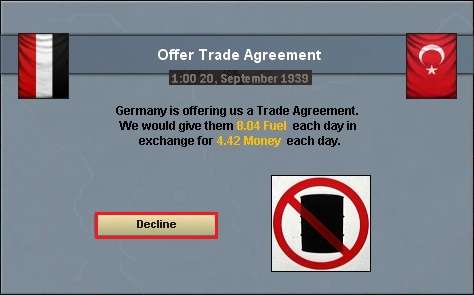
Well, the Polish intelligence services must have good contacts in Budapest: at 8pm that night, Hungary starts mobilising (though have not yet joined the war). Their protection of that border is perhaps explained [Ed: well, I’m giving them some credit, anyway].
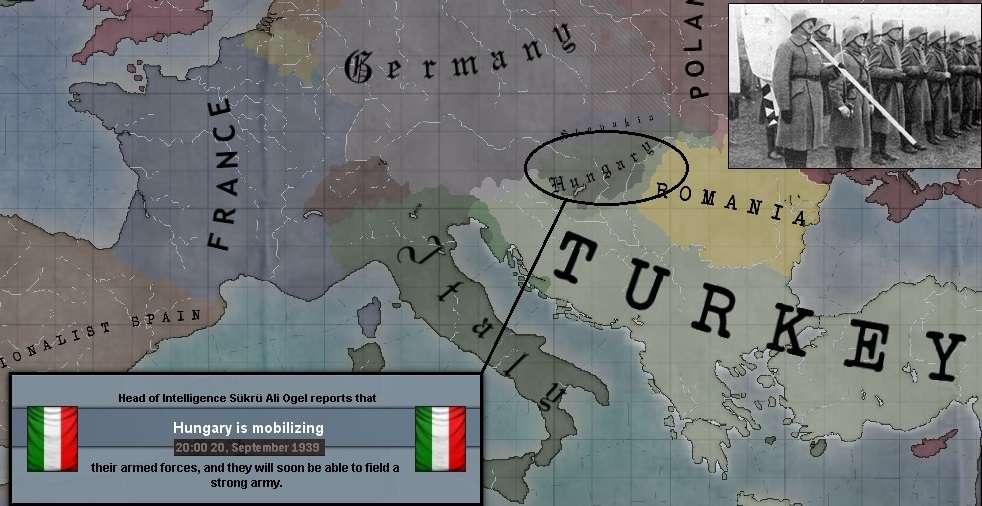
Note: the following reports are all dated 0000 21 Sep 39, but they relate to the position as known by midnight on 20 Sep, so will be covered under the reports for that day, which summarise the third week of combat in Poland.
Central Sector. Heavy fighting continues in the streets of Lodz, which is now completely isolated (Glowno to the east having been occupied some time during the day). 28th Div is still trying to evade capture to join their comrades in the 44th, but the cavalry division previously noted further to the east has disappeared, presumably surrendered. As feared, Modlin has been occupied by the Germans after they brushed away the Poles’ HQ 1st Corps. Warszawa is now surrounded on three sides, but has not yet been attacked [in OTL the Battle for Warsaw started on 8 Sep]. To the north, 3rd Div is still holding in Brodnica and the neck of the pocket remains open, with Polish units continuing to retreat through Grudziadz. 18th Div in Mlawa is now under attack from the German motorised infantry division in Plock, in another attempt by the Germans to close off the pocket. Our liaison officers are instructed to obtain an update on those two crucial battles as they develop. In a hopeful sign, more Polish reinforcements can be seen heading by rail to Warszawa from the north-east, led by 27th Div. Perhaps there will be a drawn out stand in the capital after all – though it may well end up being surrounded if the two provinces to its rear are not properly defended. This is why the fall of Modlin was such a setback.
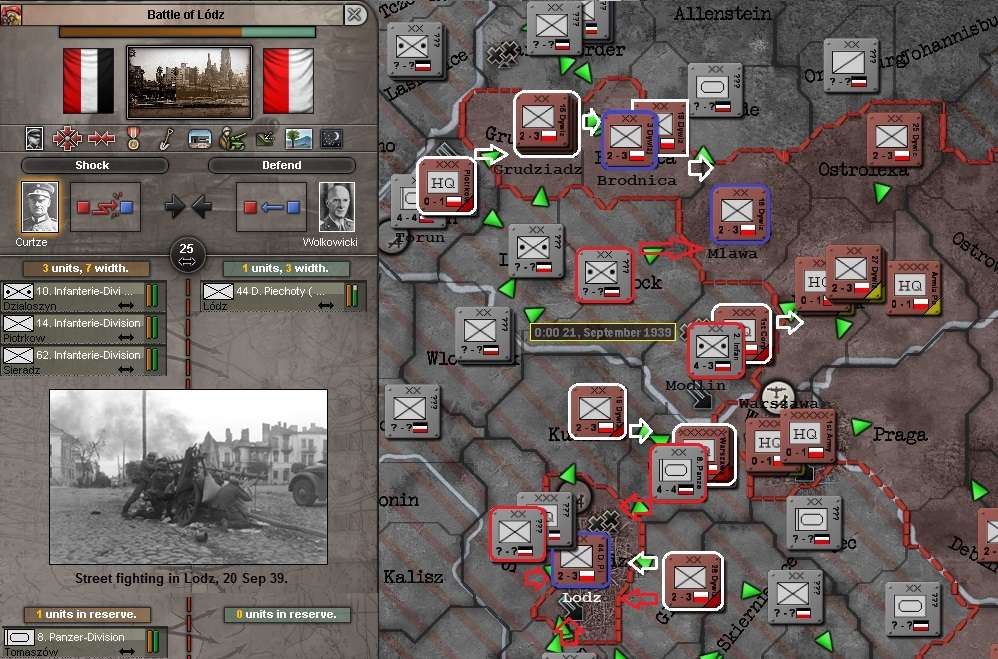
Battle of Turka. After a day of fighting, the Polish cavalry holds fast. Even more morale-boosting, they are using their mobility and the terrain to meet the German Attack with an Elastic Defence! No matter the final outcome, the exploits of Grzmot-Skotnicki and his ‘Mazowiecka’ Cavalry Division will be remembered with pride for years to come. We will also follow this battle with great interest. Huzzah!
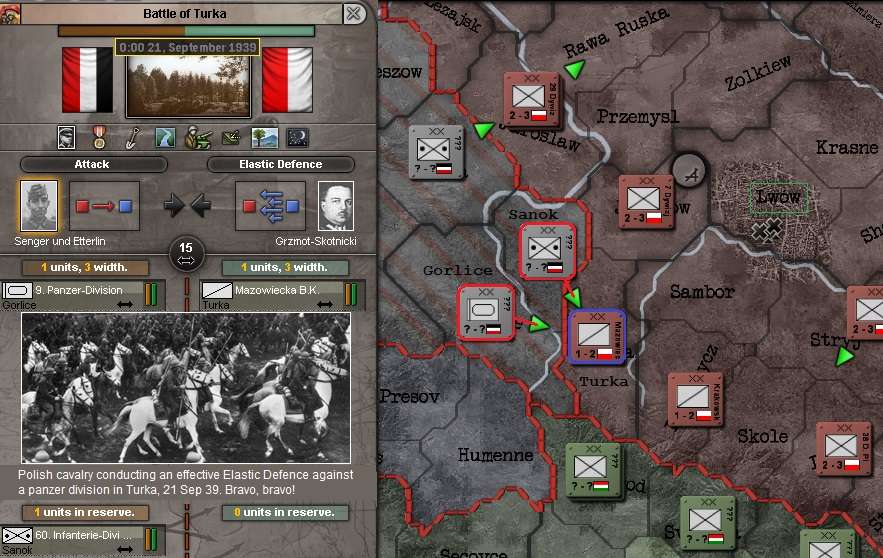
General Situation. This map shows where the Polish campaign now sits. The fall of Danzig during the last week has further sapped Poland’s will to fight, with surrender progress now at 40.9%. Two main lines of defence have emerged, one to the north and another to the south. There is a large gap between the two, which is (fortunately) not yet being directly threatened by the Germans. Other main points to note:
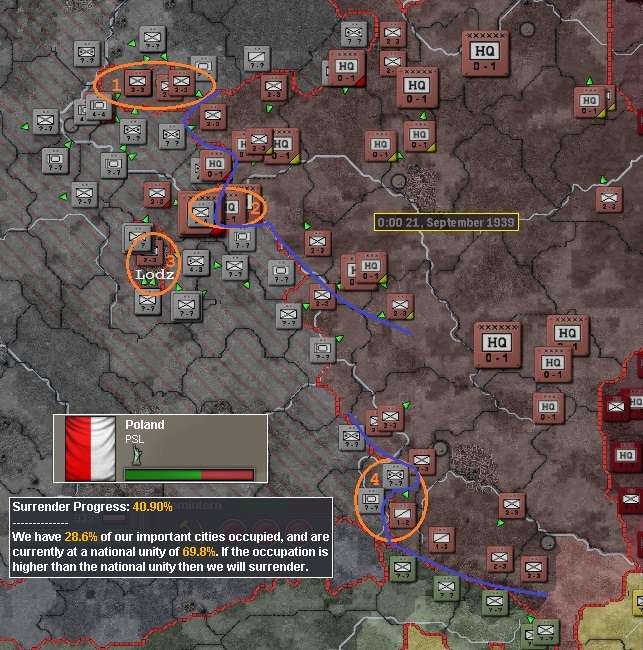
As at midnight on 20 Sep 39, the whole situation in Poland is very precarious.
Polish Infantry Equipment. Doctrine aside, our observers report that Polish infantry equipment is slightly behind the Turkish Army. Crucially, apart from not appearing to field any support brigades, let alone specialist AT units, the Poles have been working on but not yet completed level 3 infantry AT weapons! Given the main threat they knew they faced and having to fight in largely open terrain over a long border, this is almost criminal neglect! Pity the poor Polish infantry soldier.
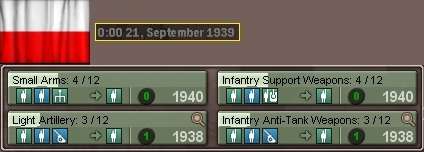
In Turkey, Aras reports more good news: alignment distance from the Comintern seems to have dropped almost another 20 points in just a week, and now sits at 131.12! The evil bastardry of those infernal Japanese agit-prop agents is being wiped away in a matter of days. Take that, Tojo! [Ed: we will blame him anyway, even if the game hasn’t installed him as Japanese PM – yet] The latest infantry equipment upgrade has put the bill – to re-equip 43 units now – up to 5.84 IC. It will delay the completion of the latest infantry brigade recently put into training, but is a price worth paying. For an infantry-heavy army, the importance of decent equipment (as proven now in Poland) cannot be stressed too much. Our Attaché will assess Polish infantry doctrine in his next report.
Finally, Goebbels’ German Propaganda Ministry has already managed to issue some telling posters for the occupied zone. Though in Polish, this is a German product being distributed in the large swath of western Poland now in German hands. It is particularly telling because it has an element of truth running through it, even though it has been twisted for German purposes.
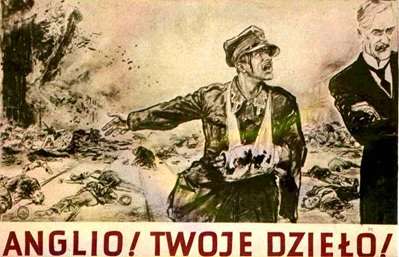
A shame-faced British PM Chamberlain is told by the wounded Polish soldier, surveying the ruins of his country:
“England! Your Fault!”
Coming Up: Another draining episode looms as the main battle for the heartland of Poland approaches. Will Warszawa be able to put up a solid defence with its hastily assembled garrison? How long can Lodz hold out? Even if it falls soon, it will have cost the Germans casualties but, even more crucially, time for Warszawa and the rest of the defence in depth to prepare itself. In the south, the exploits of the Polish cavalry defying German panzers in the woods of Turka are inspiring readers throughout the Glorious Union: not only does it make a heroic example and a riveting read, but the name of the battle itself of course inspires Turks to forgive historical grievances with the Poles as they courageously fight the raging Fascist beast. The fact everyone knows the uhlans are ultimately doomed makes no difference: if anything, it makes the story even more glorious. Glory doesn’t always end in victory – every Turkish soldier and citizen knows that well enough. Sometimes the fight itself is enough to earn immortality. Braanszon and Persephonee have already devised a tag line for a poster to be used in their forthcoming propaganda campaign for the new National Republican Guard recruiting drive: “Turks for Turka!”
“Lepiej umrzeć stojąc niż żyć na kolanach”
"It is better to die standing than to live on your knees."
"It is better to die standing than to live on your knees."
[Ed: Hope the translation is OK - got it from a wiki list of Polish proverbs. Apologies if it’s not: I may be half-Polish but have never spoken it!
I am on a bit of a run at the moment over the weekend, and the battle report format is shorter and quicker to write, so here we go again (especially as its commentary, not an explanation of one's own strategy or tactics). As a note, in real life reporting there was plenty of more detailed reporting and many more battles noted. A week per update may seem fairly slow going, but only the highlights are being reported. Alas, I am sure it will all be over soon enough. Then, if the terms of the Nazi-Soviet Pact are enforced, our propagandists will have to perform some particularly deft (or well spun) verbal contortions as they try to reconcile our hatred for German Fascist aggression and solidarity for Poland with the actions of our prospective ally. Calistar, Braanszon and Persephonee have never been quite so in-demand!]
14 Sep 39

“Poles to Arms”. They try to rally, but it looks grim.
The only war we can see happening in the West is in the air (we're not receiving naval reports). Here, the first British gun camera footage is shown. Along with some pretty crude propaganda commentary. Persephonee shakes her head while watching it; she reckons she could have done a lot better herself.
In the morning, word comes through that another Japanese puppet government, that of Manchukuo, has ordered its forces to mobilise. In the evening, New Zealand announces it is also joining the Allies and therefore the Second Great War. [Ed: Any Kiwi readers will note I have made no disrespectful reference to sheep here - it is too solemn an occasion!]

15 Sep 39
News Report: US Radio Broadcast. Charles Lindbergh makes a nationwide radio broadcast in favour of American isolationism. “It is madness to send our soldiers to be killed as we did in the last war if we turn the course of peace over to the greed, the fear and the intrigue of European nations. We must either keep out of European wars entirely or stay in European affairs permanently”, Lindbergh says. “We must not permit our sentiment, our pity, or our personal feelings of sympathy, to obscure the issue, to affect our children's lives ... America has little to gain by taking part in another European war.”

Charles Augustus Lindbergh (b. February 4, 1902) was an American aviator, military officer, author, inventor, explorer, and environmental activist. At age 25 in 1927, he went from obscurity as a U.S. Air Mail pilot to instantaneous world fame by making his Orteig Prize–winning nonstop flight from Long Island, New York, to Paris in the “Spirit of St. Louis”. This was the first solo transatlantic flight, and the first non-stop flight between North America and mainland Europe. An advocate of non-interventionism, he supported the anti-war America First Committee, which opposed American aid to Britain in its war against Germany.
16 Sep 39
Reports from the northern and central sectors of the western front, received at 0800, indicate Polish forces are coming under increasing pressure, but some are still resisting strongly. In the north, Danzig and ‘The Corridor’ are now essentially lost. The 9th Div (in Danzig) is in retreat, as is the 5th Div in Tczew – to where the 9th is attempting to retreat. MAJGEN Kruszewski’s 15th Div is still resisting against superior numbers in Laskowice (the next province south) but looks close to breaking. One or both retreating Polish divisions are likely to be cut off and forced to surrender. In Torun, the Polish 10th Div is holding well in the forests: this is a strong position covered by river-lines on all but its eastern approaches. But it is currently under attack by two panzer divisions (the 4th and 5th) led by Model. While the odds seem fair for now, the drain on the Poles' organisation is already evident. But they are holding.
The bad (worse) news for these Polish units is the seizure of Plock by a strong German motorised infantry division. Up to five Polish divisions are in danger of being cut off and pocketed in what is now a northern salient. The key fortified province of Modlin is not yet garrisoned by a front-line unit – its loss would seriously undermine any Polish plans for a long campaign of resistance. A strong German fighter force can be seen conducting air operations over the capital (4 VP). In better news, the fresh Polish 44th Div has now arrived - apparently by rail - at the key (2 VP) city of Lodz, which had seemingly been abandoned a few days earlier; just in time.

Meanwhile, Theatre Commander FM Rydz-Śmigły has been forced into ignominious retreat towards Warszawa. Our liaison officer there passes on Rydz’s current estimate of his own and the enemy’s relative power: it is not good. His ultimate objective of ‘Berlin’ might now be a trifle optimistic: his front is crumbling around him.

17 Sep 39
By 1300, the situation has deteriorated markedly. The Battle for Torun continues, but Model’s relentless panzer assault is taking its toll. It appears MAJGEN Kleeberg’s 9th Div was unable to escape from Danzig and has been forced to surrender in Tczew; which, along with Laskowice, has now been occupied by the Germans. 5th Div is still trying to make it out but, even if it does, the pocket could be closing further to the east. The Germans are closing in on the now undefended Danzig from three directions: it will soon be in their hands (and with it 2 VP).

18 Sep 39
News Report: Danzig, German-occupied Poland. Danzig falls to the Germans at 7am. The Battle of Westerplatte was the first battle in the Invasion of Poland and marked the start of the Second Great War in Europe. Beginning on September 1, 1939, German naval forces and soldiers and Danzig police assaulted the Polish Military Transit Depot (Wojskowa Składnica Tranzytowa, or WST) on the peninsula of Westerplatte, in the harbour of the Free City of Danzig. The Poles held out for seventeen days [seven days in OTL] in the face of a heavy attack that included dive bombers.

German troops seen here at Westerplatte in Danzig, the scene of heavy fighting from the first day of the war.
Our Defence Attaché in Warszawa reports that at midday, German panzer divisions have been spotted immediately to the south-west and south-east of the capital, but there is no front-line garrison as yet. This is very poor preparation and indicates the Polish leadership is in disarray: as a minimum, one infantry division (preferably three) should already have been in place and well-entrenched by now. Only GEN Szylling’s Armia Warszawa HQ is currently defending the capital (at least it hasn’t fled yet), with Bittner’s 1st Army Gp HQ heading for the east. The German armoured pincer has cut off Lodz and the two provinces to its east in a pocket. The battered 28th Div (which has been fighting since the first day of the war, starting in the border north of Katowice) and a cavalry division are attempting to break out to the north, but they stand zero chance against German medium armour. Their only hope will be to try to make it back west to Lodz for a final showdown.

A couple of HQs and one already leaving: hardly a sufficient garrison for the capital with the wolf at the door!
News Report: Berlin, Germany. That evening, William Joyce begins making English-language propaganda broadcasts over German radio to England. He would earn the nickname Lord Haw-Haw.
Joyce was of Anglo-Irish descent, but was born in Brooklyn. He returned to Ireland when he was a boy, his family later relocating to England after the Republicans took over in the south (they had backed the Protestants). On 22 October 1924, while stewarding a meeting in support of Jack Lazarus (the Conservative Party candidate for Lambeth North in the general election), Joyce was attacked by Communists and received a deep razor slash that ran across his right cheek. It left a permanent scar which ran from the earlobe to the corner of the mouth. He later turned to Fascism.

William Brooke Joyce (b. 24 April 1906), nicknamed Lord Haw-Haw, is an American-born, Fascist politician and now Nazi propaganda broadcaster to the United Kingdom.
At 2300, a report is received that Torun has fallen to the Germans. Our Attaché is not sure what has become of the gallant defenders, but the pocket has not yet been closed off, so some more troops may emerge from it in the next day or two.
19 Sep 39
News Report: Danzig, German-occupied Poland. Hitler enters the recently occupied former Free City of Danzig and gives a speech denouncing the Polish government and warning England that Germany would never capitulate even if the war lasted years.
20 Sep 39
The early morning brings news from the ‘Torun-Grudziadz Pocket’, which still remains open but is now threatened with closure by a German attack from Marienwerder on Brodnica. Further west, a corps HQ and three Polish infantry divisions are still trying to escape. MAJGEN Orlick-Lukoski’s 3rd Div is holding strong, but the accompanying 19th Div is almost out of organisation and will surely break at any moment. The fate of their comrades now rests squarely on the shoulders of 3rd Div against the German’s attempted Breakthrough attack.

In Lodz, MAJGEN Wolkowicki’s 44th Div fights on against heavy odds, making use of the favourable urban terrain, fortifications and entrenchments. At present, German infantry (led by MAJGEN Curtze, with three divisions) is doing the main fighting: they are trying a Shock assault to force a quick result. If that doesn’t work, they have the 8th Pz Div is reserve. To the east, the beleaguered 28th Div is trying to make it to Lodz, for a desperate last stand. The cavalry division seen further to the east looks like it will be cut off and forced to surrender.
In slightly better news, our Attaché reports the Polish 22nd Div has just arrived by rail in Warszawa. They will need to entrench quickly if they are to hold out for any length of time and need more reinforcements to do so, at that. To make things more dangerous, the key fortress of Modlin to the north-west is still undefended.

On the southern front, things are now faring a little better, with reinforcements from the east having arrived. Poland appears to have consolidated a line of defence in front of the key southern city of Lwow. The Germans have picked on what they must assess as the weak point in this hastily constituted line, with the 9th Pz Div launching a Shock attack on MAJGEN Grzmot-Skotnicki’s ‘Mazowiecka’ Cav Div in Turka. German panzers against Polish Cavalry! But in this case, rather than launching reckless charges, the cavalry is using its mobility and the cover of the forest terrain to put up a solid defence. And while the sabre may not work well against panzers, it seems to do fine against German motor-cycle troops when they are ambushed in the forest!

And to put the Polish lances (as opposed to cavalry) vs German panzers ‘fake news’ to bed, see this excerpt [Ed: article has not been cross-checked or verified by me, but it is in line with my understanding of the real situation and certainly seems to be the way the game plays it]:
The problem with all these reports is that no mounted Polish cavalrymen ever charged at German tanks with lances in World War II. It was ... “a myth of the second world war, fostered by Nazi propagandists…. There is no evidence that this occurred.” Indeed, Poland’s cavalrymen—wielding rifles, machine guns, and antitank guns—played an important role in just about every major battle of the September Campaign, yet for seven decades they have had to face down the propaganda promulgated by the Nazis and inflated into myth by the Western press. What really happened is a far more interesting story, one of bravery and professionalism in the face of overwhelming odds, a story that clearly indicates that far from being a military anachronism, the Polish uhlan in 1939 was a tough and dangerous adversary.
For a little more detail, see here for the article summary: http://www.historynet.com/1939-polish-cavalry-vs-german-panzers.htm
Although Hungary is in the Axis, they have not yet entered the war. But that has not stopped the Poles from assembling a solid fortified line along that border (though the river-line extending south-west from Lwow might have been a more defendable depth position). Do the Poles know something we don’t? Perhaps they have learned the lesson of not having properly garrisoned the Slovakian border at the start of the war.
Back home in Turkey, a very welcome technical advance has been made: the third of the level 3 (1938 model) infantry equipment techs has been researched. Only Light Artillery (due in December) is required now for all four to be completed. Now that we have put such a heavy investment into fixed AA installations, it’s time to take its efficiency to the next level.

Next, Foreign Minister Aras takes great pleasure in declining another trade request from the filthy Hun aggressor: they want good Turkish fuel to power their evil war machine as it drives across Poland. The cheek of it! The answer is a firm “asla”!

Well, the Polish intelligence services must have good contacts in Budapest: at 8pm that night, Hungary starts mobilising (though have not yet joined the war). Their protection of that border is perhaps explained [Ed: well, I’m giving them some credit, anyway].

Note: the following reports are all dated 0000 21 Sep 39, but they relate to the position as known by midnight on 20 Sep, so will be covered under the reports for that day, which summarise the third week of combat in Poland.
Central Sector. Heavy fighting continues in the streets of Lodz, which is now completely isolated (Glowno to the east having been occupied some time during the day). 28th Div is still trying to evade capture to join their comrades in the 44th, but the cavalry division previously noted further to the east has disappeared, presumably surrendered. As feared, Modlin has been occupied by the Germans after they brushed away the Poles’ HQ 1st Corps. Warszawa is now surrounded on three sides, but has not yet been attacked [in OTL the Battle for Warsaw started on 8 Sep]. To the north, 3rd Div is still holding in Brodnica and the neck of the pocket remains open, with Polish units continuing to retreat through Grudziadz. 18th Div in Mlawa is now under attack from the German motorised infantry division in Plock, in another attempt by the Germans to close off the pocket. Our liaison officers are instructed to obtain an update on those two crucial battles as they develop. In a hopeful sign, more Polish reinforcements can be seen heading by rail to Warszawa from the north-east, led by 27th Div. Perhaps there will be a drawn out stand in the capital after all – though it may well end up being surrounded if the two provinces to its rear are not properly defended. This is why the fall of Modlin was such a setback.

Battle of Turka. After a day of fighting, the Polish cavalry holds fast. Even more morale-boosting, they are using their mobility and the terrain to meet the German Attack with an Elastic Defence! No matter the final outcome, the exploits of Grzmot-Skotnicki and his ‘Mazowiecka’ Cavalry Division will be remembered with pride for years to come. We will also follow this battle with great interest. Huzzah!

General Situation. This map shows where the Polish campaign now sits. The fall of Danzig during the last week has further sapped Poland’s will to fight, with surrender progress now at 40.9%. Two main lines of defence have emerged, one to the north and another to the south. There is a large gap between the two, which is (fortunately) not yet being directly threatened by the Germans. Other main points to note:
- Poland is still fighting hard to extract as many troops as possible from the pocket in the north.
- The defences in Warszawa are beginning to strengthen, but remain underprepared. It is the lynchpin of the entire northern line and (of course) is critical for the morale of the Polish people. If it falls, national surrender can’t be far away.
- Lodz holds out: a welcome delay of the German invader and a temporary morale boost for the nation. But the corollary will be despair when it falls.
- The action in Turka also seems to have temporarily taken the steam out of the German attack in the south, especially as most of their forces have been pushed north towards Warszawa. And if Hungary does attempt a stab in the back, at least there is a reasonable line of defence forming there.

As at midnight on 20 Sep 39, the whole situation in Poland is very precarious.
Polish Infantry Equipment. Doctrine aside, our observers report that Polish infantry equipment is slightly behind the Turkish Army. Crucially, apart from not appearing to field any support brigades, let alone specialist AT units, the Poles have been working on but not yet completed level 3 infantry AT weapons! Given the main threat they knew they faced and having to fight in largely open terrain over a long border, this is almost criminal neglect! Pity the poor Polish infantry soldier.

In Turkey, Aras reports more good news: alignment distance from the Comintern seems to have dropped almost another 20 points in just a week, and now sits at 131.12! The evil bastardry of those infernal Japanese agit-prop agents is being wiped away in a matter of days. Take that, Tojo! [Ed: we will blame him anyway, even if the game hasn’t installed him as Japanese PM – yet] The latest infantry equipment upgrade has put the bill – to re-equip 43 units now – up to 5.84 IC. It will delay the completion of the latest infantry brigade recently put into training, but is a price worth paying. For an infantry-heavy army, the importance of decent equipment (as proven now in Poland) cannot be stressed too much. Our Attaché will assess Polish infantry doctrine in his next report.
Finally, Goebbels’ German Propaganda Ministry has already managed to issue some telling posters for the occupied zone. Though in Polish, this is a German product being distributed in the large swath of western Poland now in German hands. It is particularly telling because it has an element of truth running through it, even though it has been twisted for German purposes.

A shame-faced British PM Chamberlain is told by the wounded Polish soldier, surveying the ruins of his country:
“England! Your Fault!”
Coming Up: Another draining episode looms as the main battle for the heartland of Poland approaches. Will Warszawa be able to put up a solid defence with its hastily assembled garrison? How long can Lodz hold out? Even if it falls soon, it will have cost the Germans casualties but, even more crucially, time for Warszawa and the rest of the defence in depth to prepare itself. In the south, the exploits of the Polish cavalry defying German panzers in the woods of Turka are inspiring readers throughout the Glorious Union: not only does it make a heroic example and a riveting read, but the name of the battle itself of course inspires Turks to forgive historical grievances with the Poles as they courageously fight the raging Fascist beast. The fact everyone knows the uhlans are ultimately doomed makes no difference: if anything, it makes the story even more glorious. Glory doesn’t always end in victory – every Turkish soldier and citizen knows that well enough. Sometimes the fight itself is enough to earn immortality. Braanszon and Persephonee have already devised a tag line for a poster to be used in their forthcoming propaganda campaign for the new National Republican Guard recruiting drive: “Turks for Turka!”
Last edited:
- 1
America has little to gain by taking part in another European war.”
Heh. Hindsight's a bitch ain't it?
The problem with all these reports is that no mounted Polish cavalrymen ever charged at German tanks with lances in World War II. It was ... “a myth of the second world war, fostered by Nazi propagandists…. There is no evidence that this occurred.” Indeed, Poland’s cavalrymen—wielding rifles, machine guns, and antitank guns—played an important role in just about every major battle of the September Campaign, yet for seven decades they have had to face down the propaganda promulgated by the Nazis and inflated into myth by the Western press. What really happened is a far more interesting story, one of bravery and professionalism in the face of overwhelming odds, a story that clearly indicates that far from being a military anachronism, the Polish uhlan in 1939 was a tough and dangerous adversary.
They actually did an amazing job considering what they had to work with and knowing full well that they ad been abandoned and left to die to buy time for France. They recognised in the first few days of the war what it took everyone else another few years to spot: the German advance was mighty but the German stomach was mightier. So they raided supply lines and encampments constantly through all hours of the day. Had poland a strongish defensive line in the middle of the country, the germans would have been halted for months as they tried to kill the cavalry hitti them from all side she as well as break the defensive line with fewer resources.
It's telling that in this scenario, Poland has made a tempary defsive line and with that and the cav alone set the German timetable back by weeks (compared to OtL). Any and all time and manpower spent on Poland, the weakest link in the chain of Allies, is time and manpower that will be sorely missed in France. It could be that after the axis wins in France, they have to halt for months or a full year to resupply and recover. Hardly consolation for Europe but a rather good victory against a faction that went to war in the first place because it was struggling for resources.
Turkey might be alright after all. Of course, the Russians could invade now form the other side of Poland and ruin everything...
Battle of Turka. After a day of fighting, the Polish cavalry holds fast. Even more morale-boosting, they are using their mobility and the terrain to meet the German Attack with an Elastic Defence! No matter the final outcome, the exploits of Grzmot-Skotnicki and his ‘Mazowiecka’ Cavalry Division will be remembered with pride for years to come. We will also follow this battle with great interest. Huzzah!
See above.
- 1
And while the sabre may not work well against panzers, it seems to do fine against German motor-cycle troops when they are ambushed in the forest!
That's just epic.
And to put the Polish lances (as opposed to cavalry) vs German panzers ‘fake news’ to bed, see this excerpt [Ed: article has not been cross-checked or verified by me, but it is in line with my understanding of the real situation and certainly seems to be the way the game plays it]:
Interesting, I have suspected for a while (since I started seriously reading about WW2, when I started playing HOI3), that the Polish weren't stupid enough to deliberately charge at tanks on horseback with lances, but it's nice to see such suspicions confirmed.
Next, Foreign Minister Aras takes great pleasure in declining another trade request from the filthy Hun aggressor: they want good Turkish fuel to power their evil war machine as it drives across Poland. The cheek of it! The answer is a firm “asla”!
This is perfect communist behaviour, refusing an extremely lucrative trade deal because you despise their ideology, and because there might be a long term benefit to it. A true capitalists would have just taken the deal and laughed at how much the Germans were having to dish out for their fuel... You are obviously learning, and that might have something to do with this:
In Turkey, Aras reports more good news: alignment distance from the Comintern seems to have dropped almost another 20 points in just a week, and now sits at 131.12!
SkitalecS3 is said to be very pleased by this...
A shame-faced British PM Chamberlain is told by the
wounded Polish soldier, surveying the ruins of his country:
“England! Your Fault!”
Yes England, why didn't you sail into the Baltic with half of your army to save Poland? Love the poster...
- 1
Threadmarks
View all 328 threadmarks
Reader mode
Reader mode

